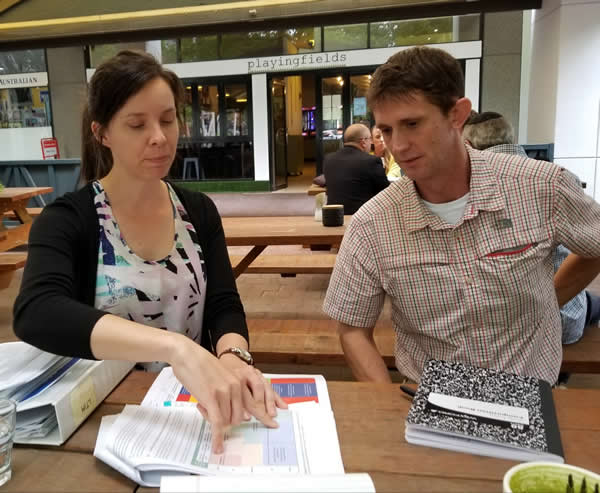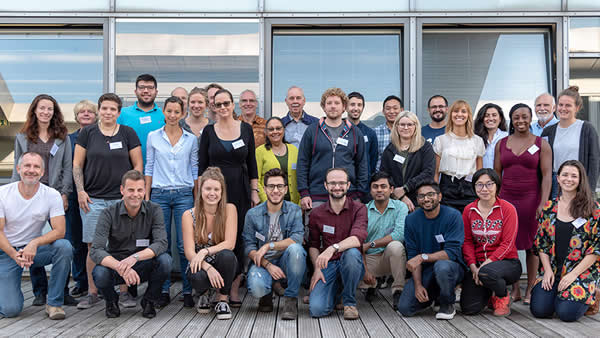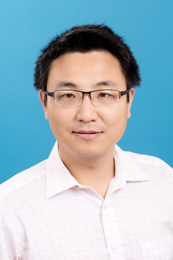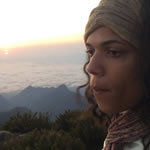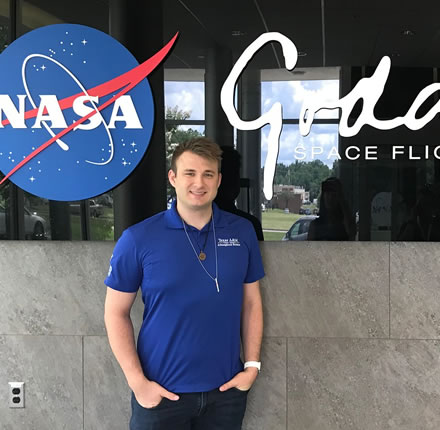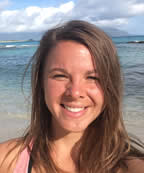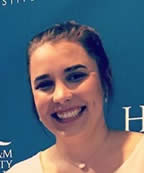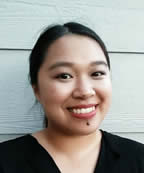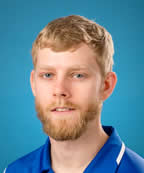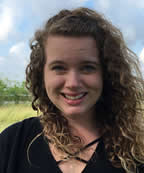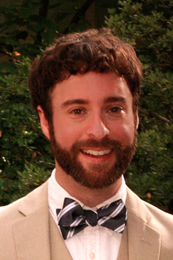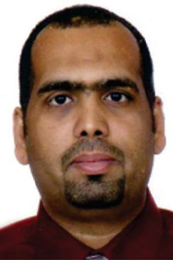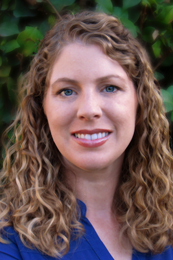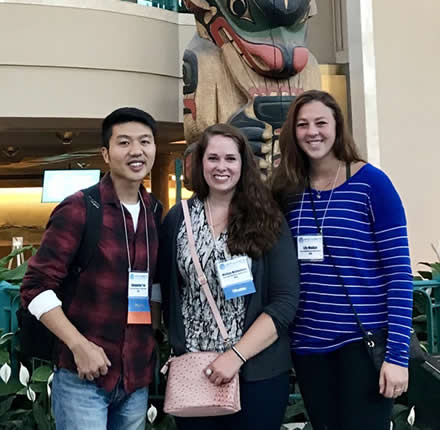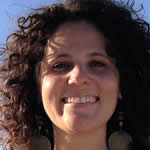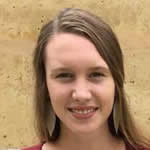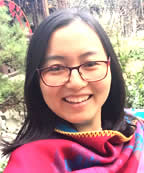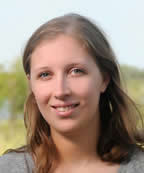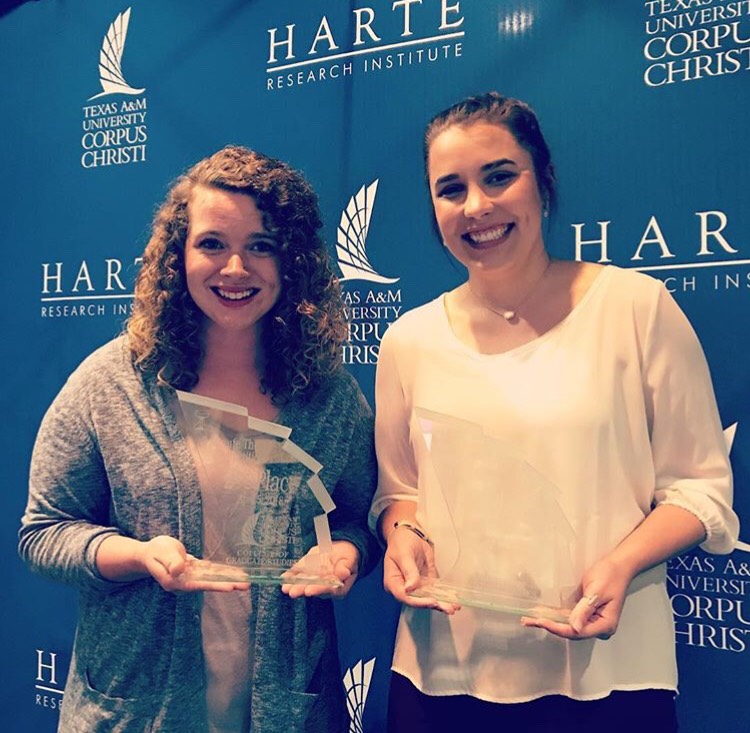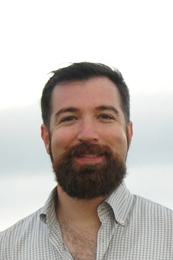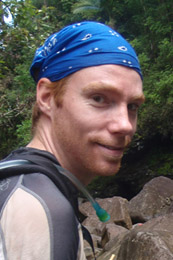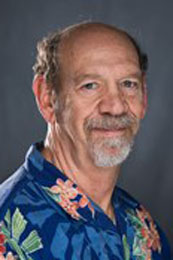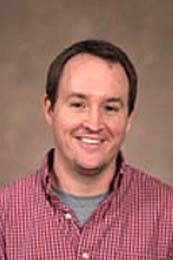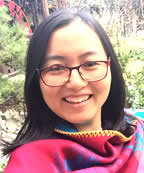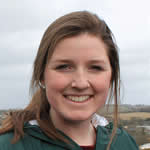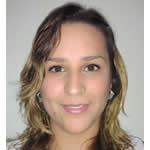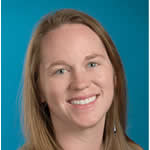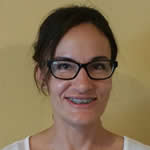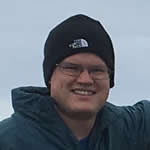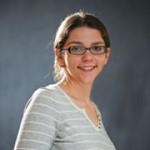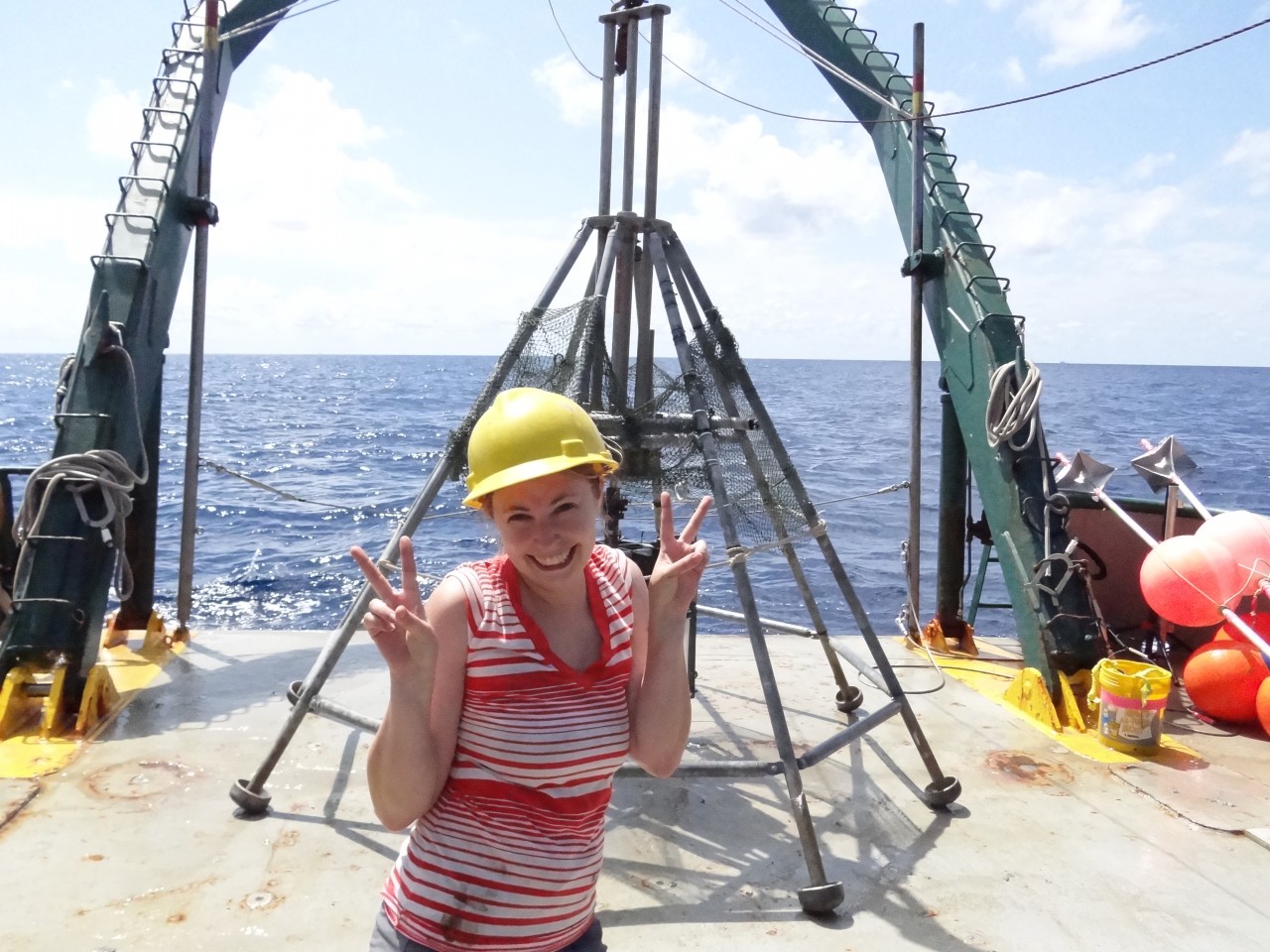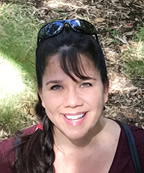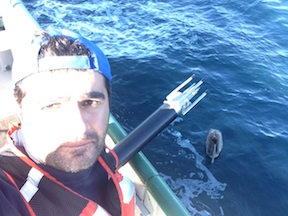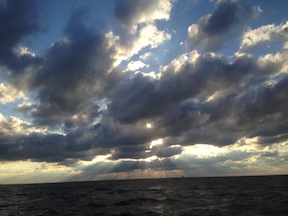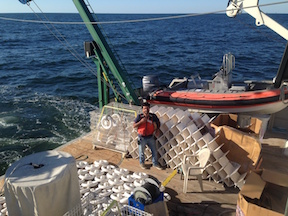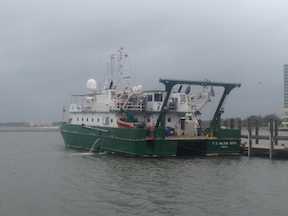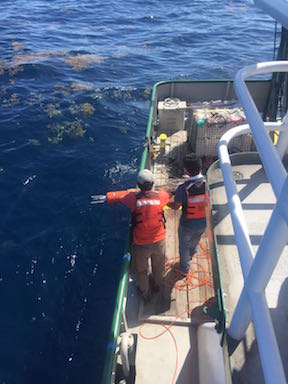CMSS News
2024
June 2024 Congratulations to Ifeanyi Anyanwu for being selected to attend the upcoming BRIGHTE Workshop on Exploring Coastal Resilience and Flood Risk Through Geospatial Storytelling. The workshop will be held in Boulder, Colorado, at NSF NCAR on August 12-13, 2024.
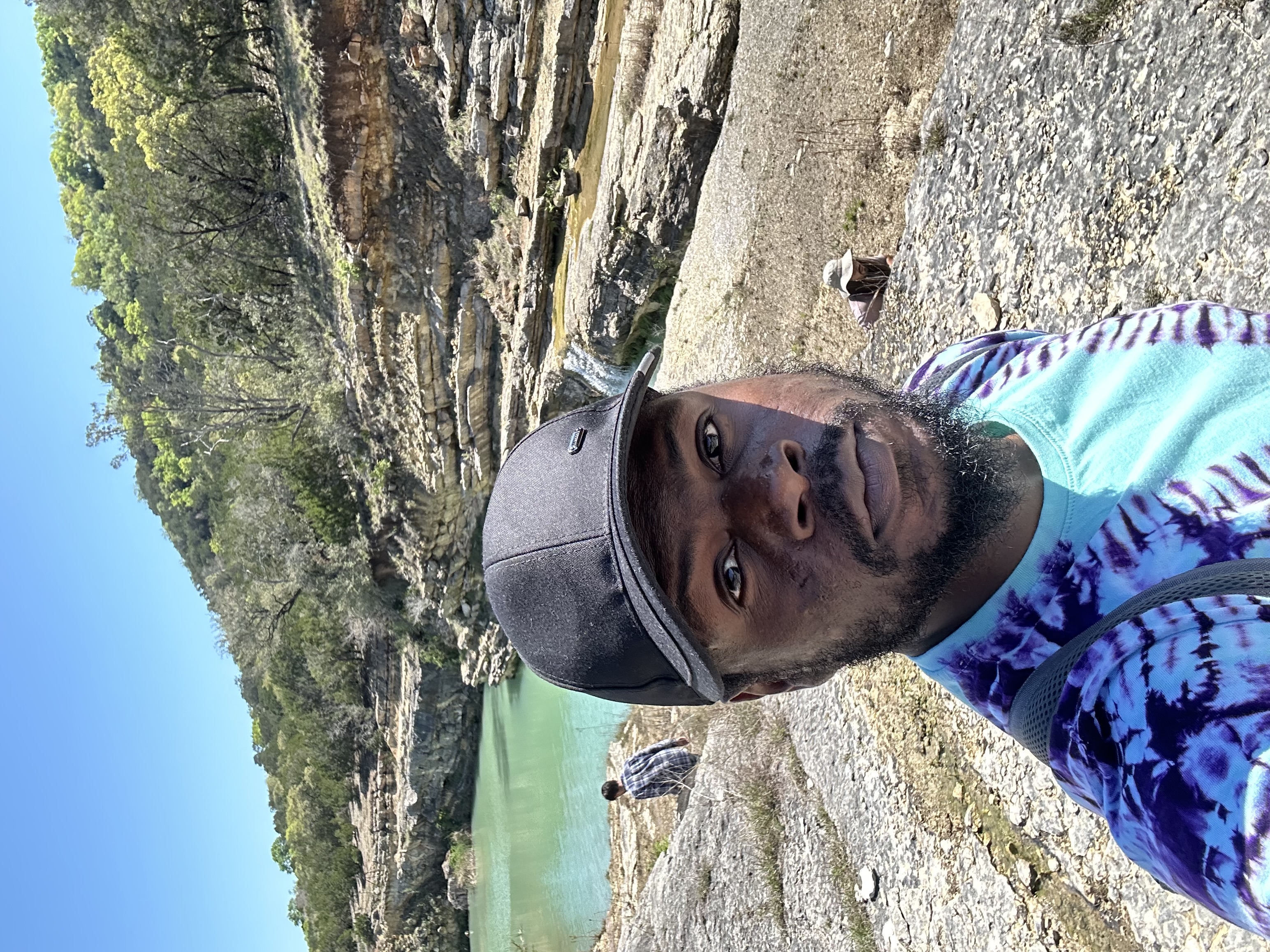
May 2024 MS Hailey Santa Ana (faculty advisor: Chuntao Liu) and Meghan Bygate (faculty advisor: Mohamed Ahmed) successfully defended their master's theses to graduate from the CMSS program at Texas A&M University - Corpus Christi. Congratulations for the achievements and good luck with your future endeavors!
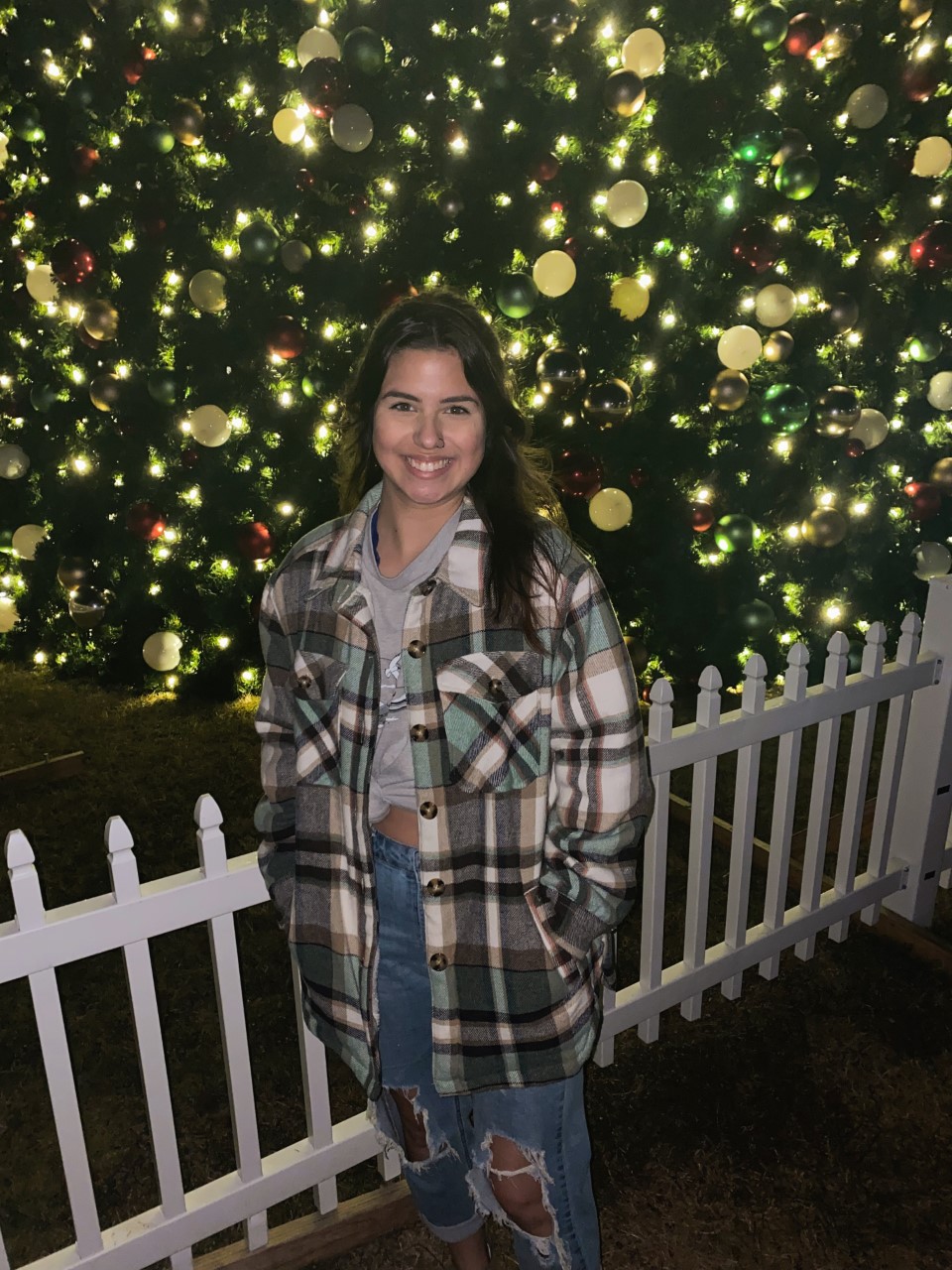
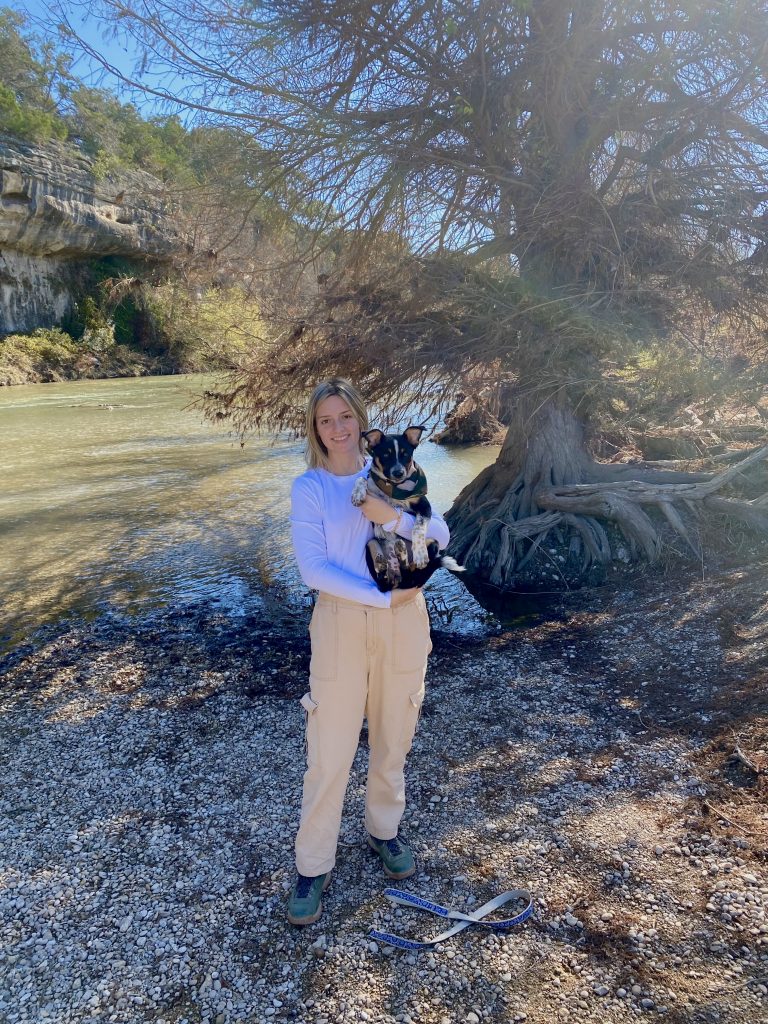
January 2024 Doctoral students Ifeanyi Anyanwu, Justin Elliott, and Allyson Girard (first row) and master's students Laura Button and Quincy Walker (second row) begin their one year NSF Research Traineeship in Harnessing the Data Revolution for Stakeholder-Guided Environmental Science (NRT STAGES). They are joined by Amanda Burton and Remi Labeille from the Chemistry program and Mahima Yogesh from the Marine Biology program.

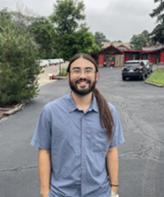
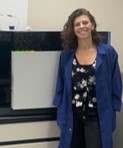
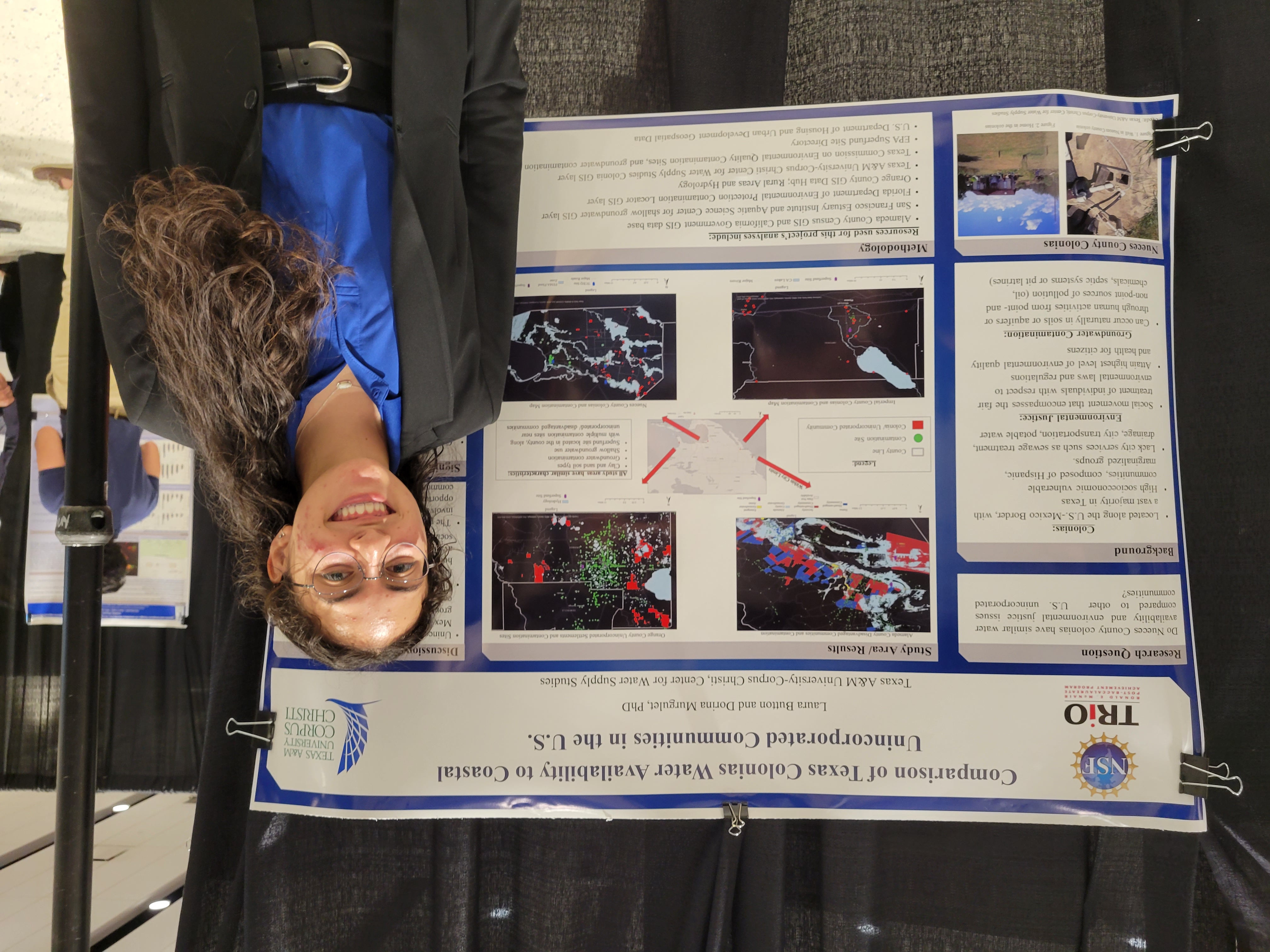
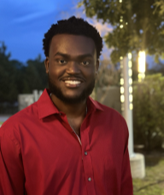
2023
December Drs. Anthony Lima (faculty advisors: Jennifer Beseres Pollack and David Yoskowitz) and Tommy Winning (faculty advisor: Feiqin Xie) successfully defended their doctoral dissertations to graduate from the CMSS program at Texas A&M University - Corpus Christi. Congratulations for the achievements and good luck with your future endeavors!
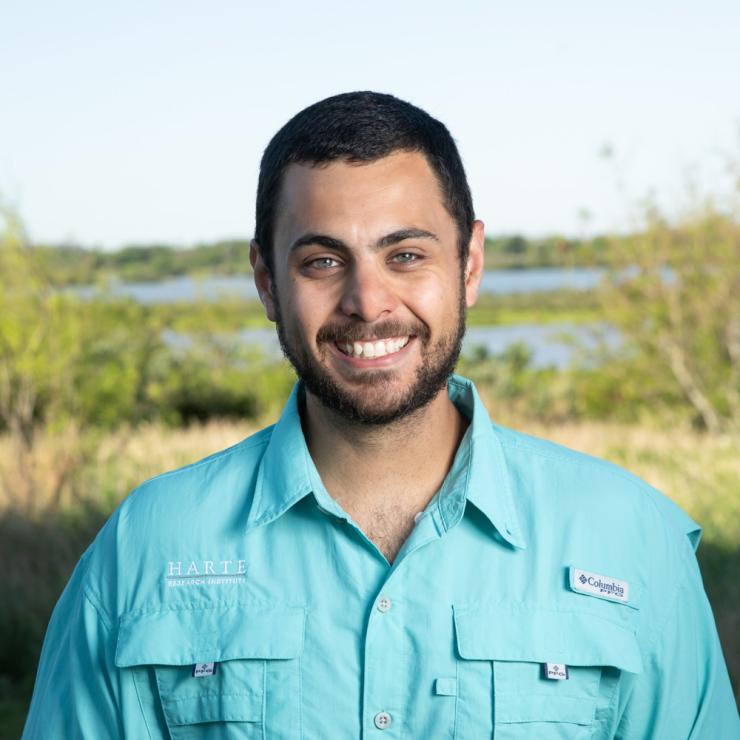
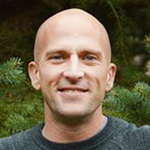
May Drs. Mariana León Pérez (faculty advisor: James Gibeaut) and Yixi Qui (faculty advisor: J. David Felix) and MS Anthony Cox (faculty advisor: J. David Felix), Jennifer Gilmore (faculty advisor: Jennifer Beseres Pollack), and Erin Taylor (faculty advisor: J. David Felix) successfully defended their doctoral dissertations and master's theses to graduate from the CMSS program at Texas A&M University - Corpus Christi. Congratulations for the achievements and good luck with your future endeavors!
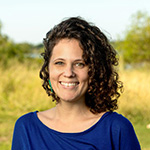

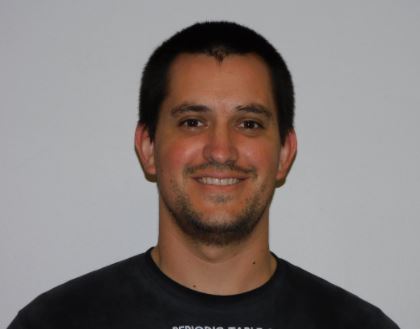
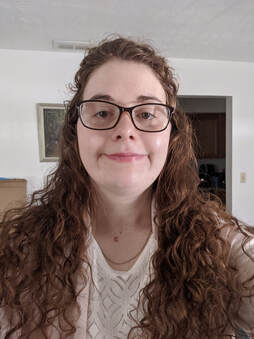
January 8-12 Congratulations to PhD student Miranda White (CBI AI2ES, NRT STAGES) for her big win at the American Meteorological Society's 103rd Annual Meeting poster session! Miranda’s poster on “AI Ensemble Predictions for Cold Stunning Events in the Shallow Laguna Madre” received FIRST PLACE for the student poster competition! Great job Miranda!
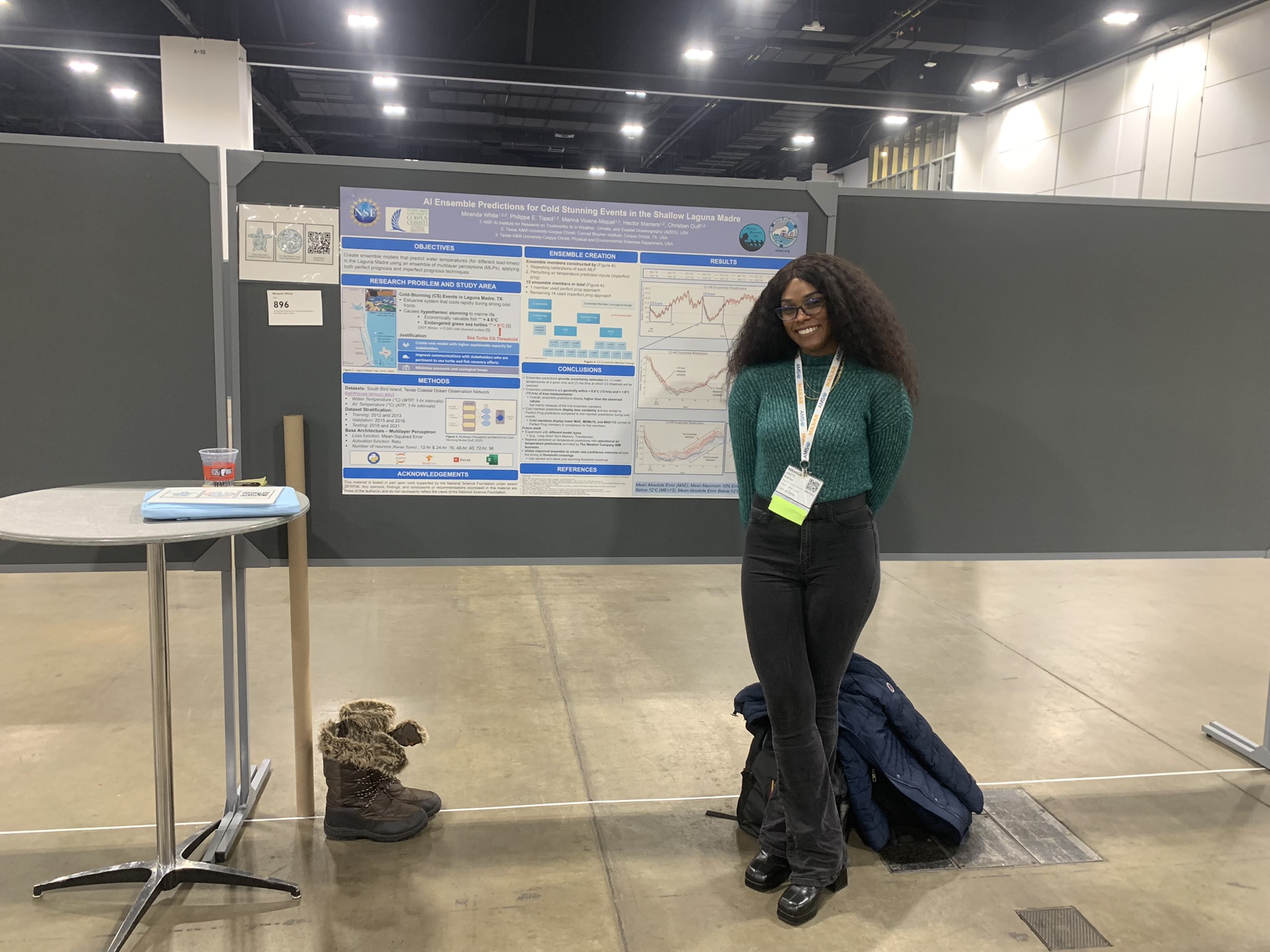
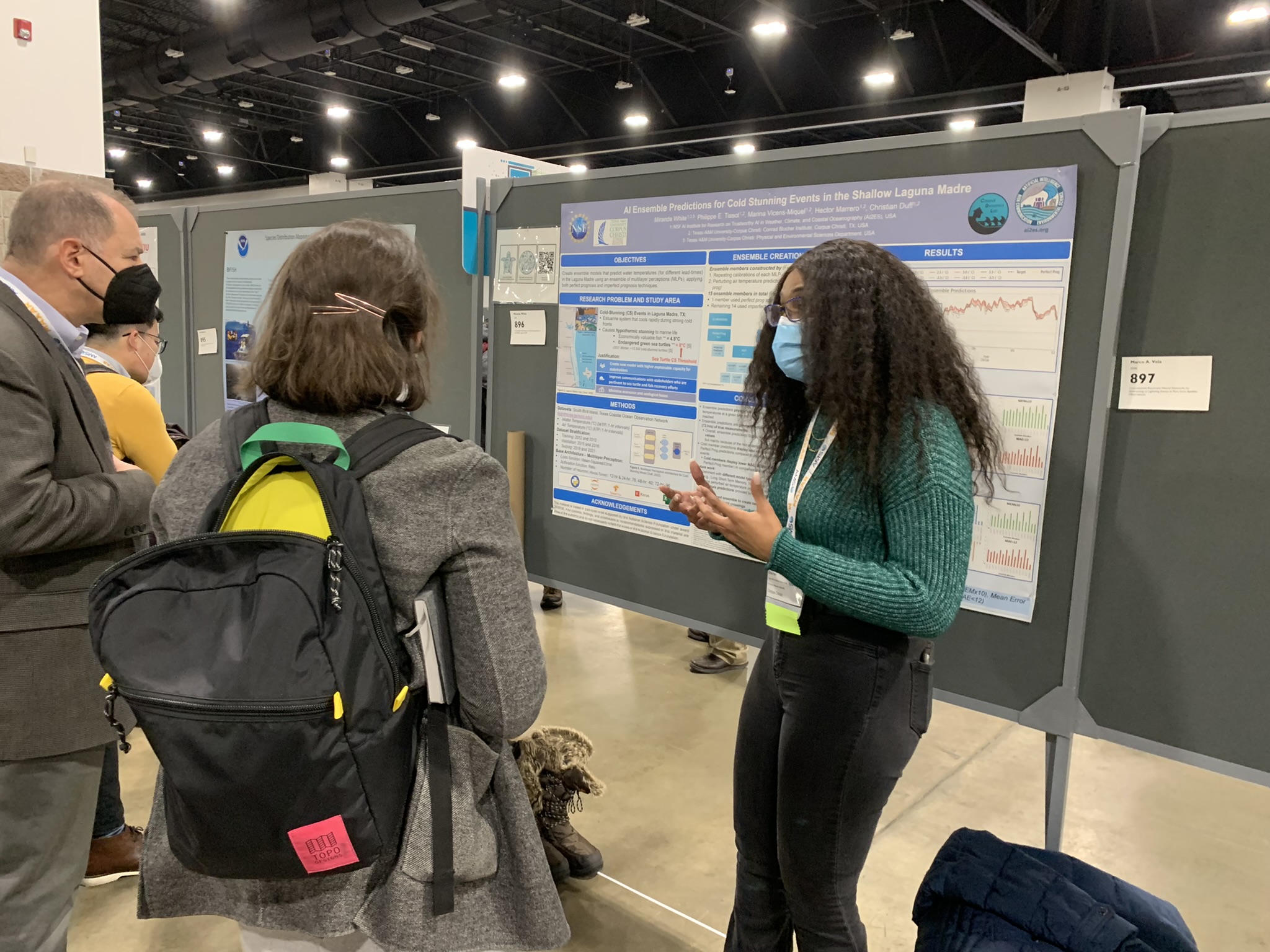
January 2023 Doctoral students Evalynn Jundt, Nigel Lascelles Jr, Youwen Wang, Miranda White and Derry Xu (first row) and master's students Skylar Meehan and Hailey Santa Ana (second row) begin their one year NSF Research Traineeship in Harnessing the Data Revolution for Stakeholder-Guided Environmental Science (NRT STAGES).
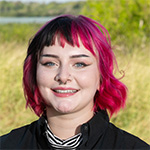
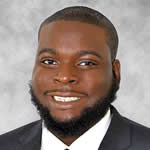
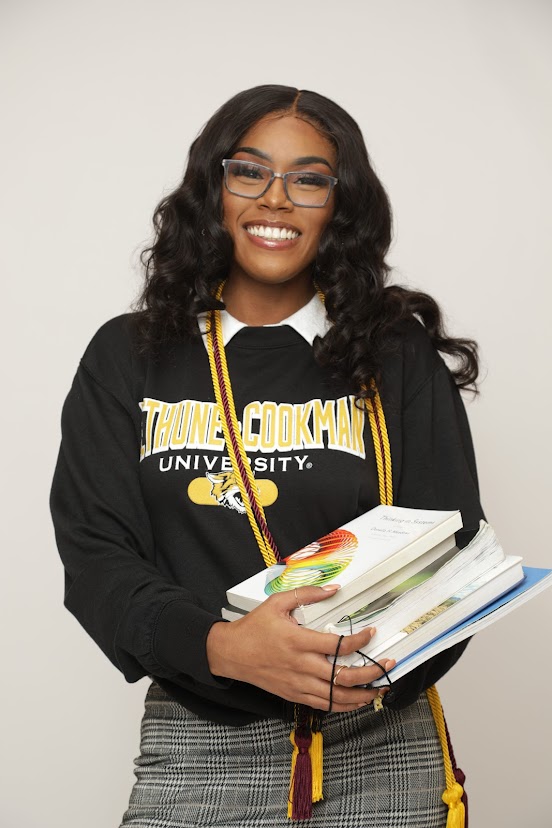
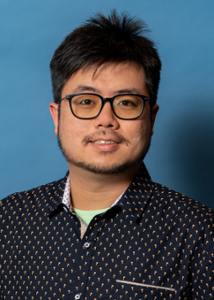
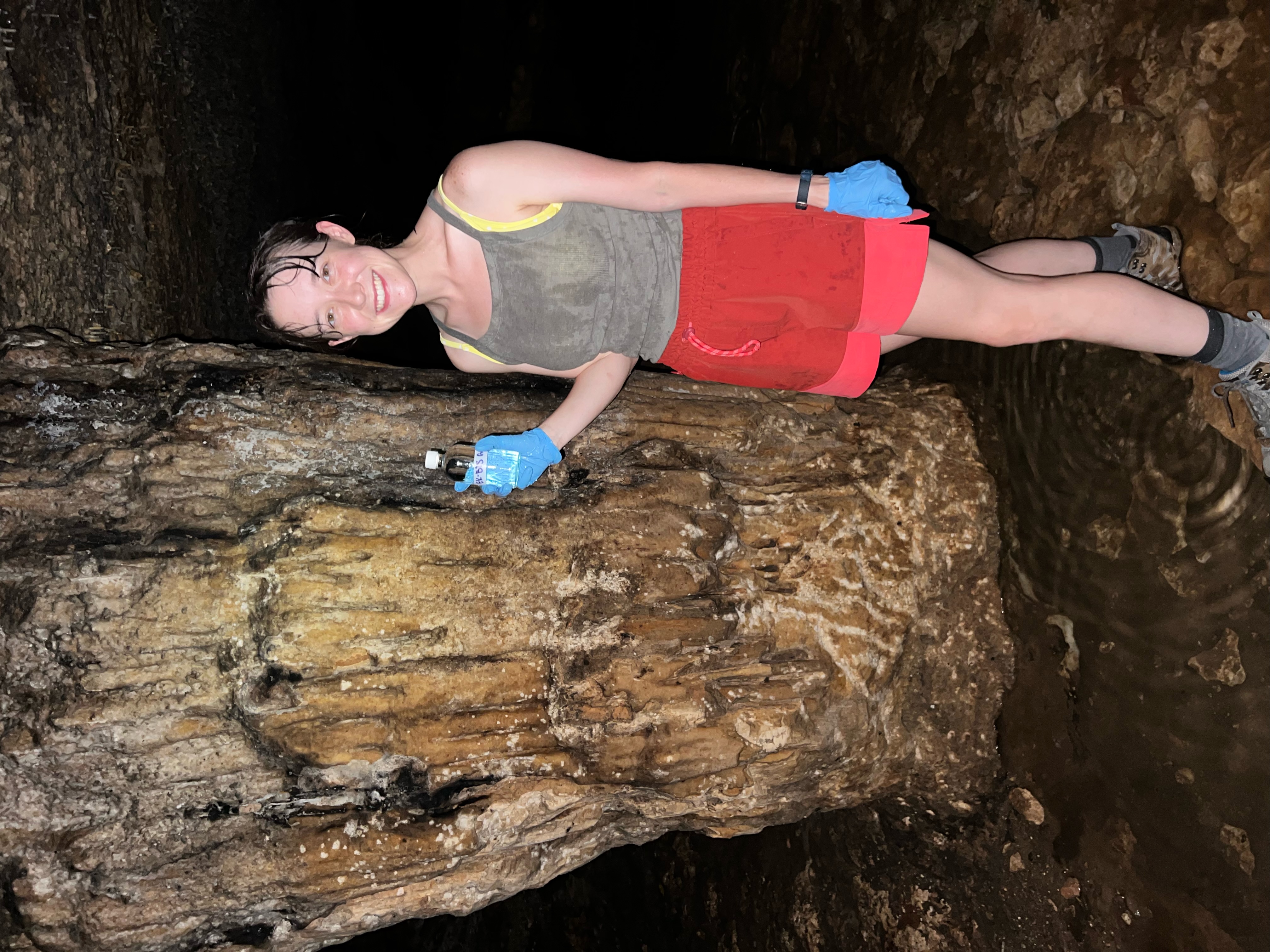

2022
December 2022 Drs. Elizabeth Del Rosario Gomaa (faculty advisor: Dr. Paul Montagna), Larissa Dias (faculty advisor: Dr. Xinping Hu), Thomas Lavigne (faculty advisor: Dr. Chuntao Liu), and Sagar Shrestha (faculty advisor: Dr. Hussain Abdulla) (first row) and MS Monisha Sugla (faculty advisor: Dr. Jennifer Beseres-Pollack) and Christopher Vickers (faculty advisor: Dr. Dorina Murgulet) (second row) successfully defended their doctoral dissertations and master's theses to graduate from the CMSS program at Texas A&M University - Corpus Christi. Congratulations for the achievements and good luck with your future endeavors!
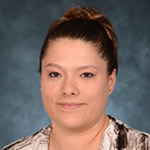
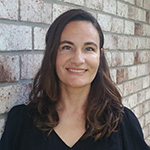
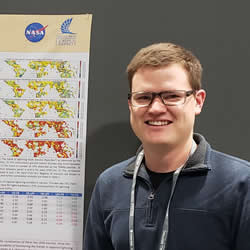
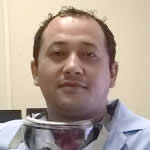
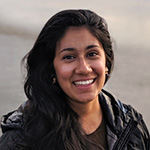
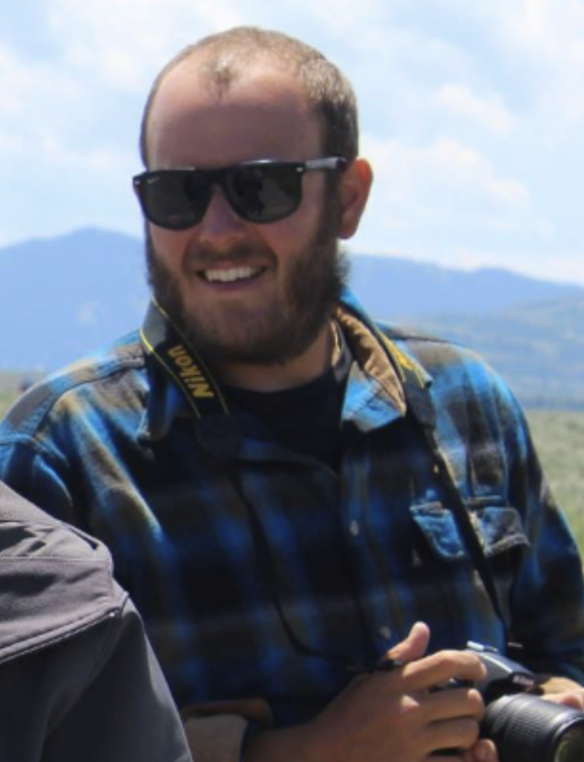
September 2022 Congratulations to CMSS alumni Dr. Audrey Douglas and her co-authors (Dr. Dorina Murgulet, Megan Greige [undergrad researcher], Dr. Kousik Das, Dr. J. David Felix, and Dr. Hussain Abdulla) on the publication of their Hurricane Harvey study of the response of inorganic nitrogen and dissolved organic matter composition to the storm's negative storm surge in Corpus Christi Bay. Find the open access article here: https://doi.org/10.3389/fmars.2022.961206. 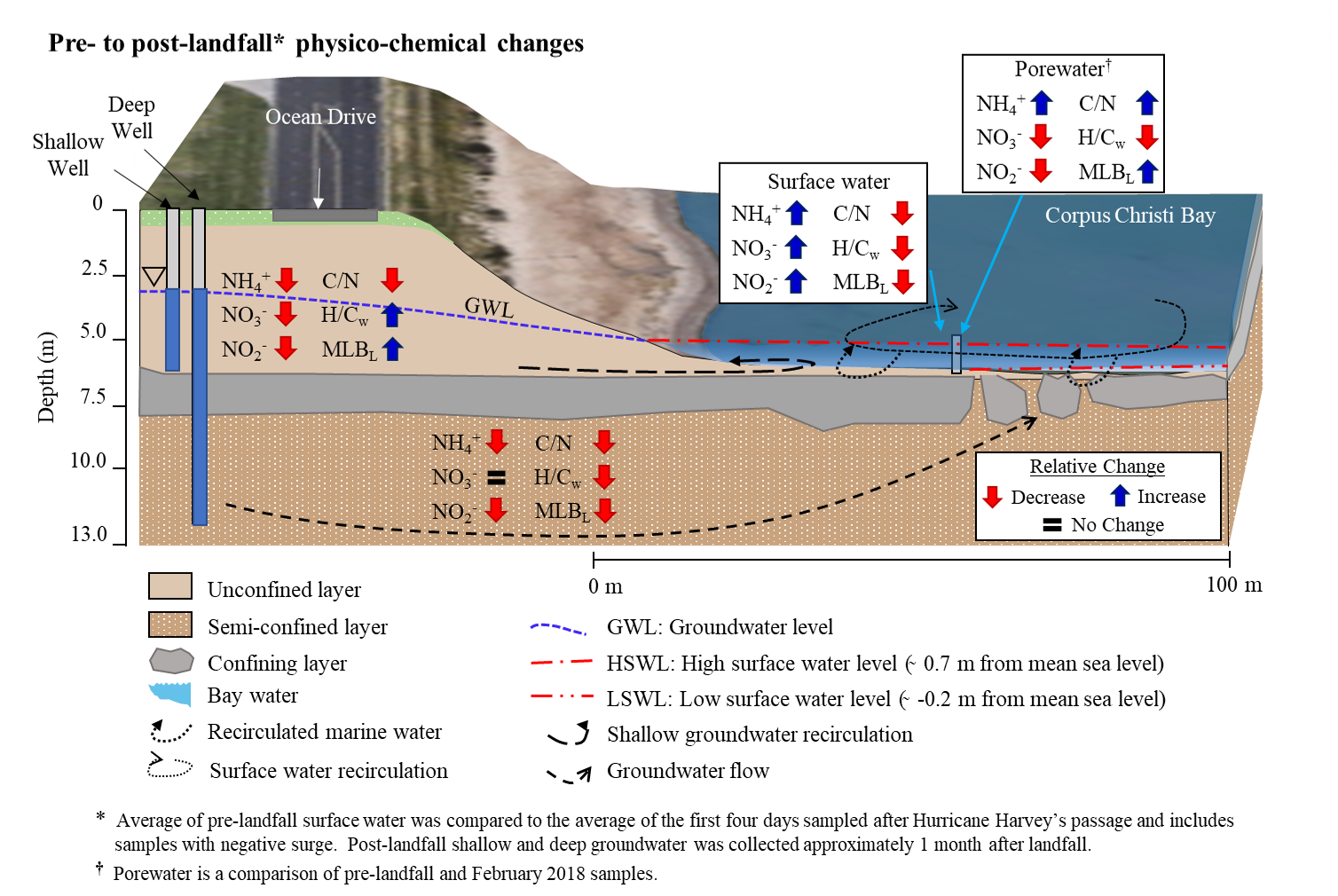 Graphical Abstract: Conceptual model of change in hydrological system and occurrence of studied dissolve inorganic and organic compounds before and during/after Hurricane Harvey.
Graphical Abstract: Conceptual model of change in hydrological system and occurrence of studied dissolve inorganic and organic compounds before and during/after Hurricane Harvey. Figure 1: (A) The Hurricane Harvey path and Saffir–Simpson Hurricane Wind Scale categories (Blake and Zelinsky, 2018) and precipitation totals. (B) The geographic location of the study area with major river basins, stream gauges (Nueces River at Calallen, TX [08211500], and Oso Creek at Corpus Christi [08211520]), salinity stations (Nueces Bay [NUDE3, 043] and Bird Island [NPSBI, 171]), waste water treatment plants (WWTP), and Harvey storm track shown. Samples were collected from the Texas A&M University-Corpus Christi beach on Ward Island (University Beach). (C) Overhead view of Ward Island (credit:TAMUCC MARCOM, CCBY-SA 4.0) showing the location of the sampling transect for the vertical crosssectional representation of the study site with the sampling locations of groundwater and porewater shown. Surface water was collected inline with the groundwater and porewater within 10m of the waterline.
Figure 1: (A) The Hurricane Harvey path and Saffir–Simpson Hurricane Wind Scale categories (Blake and Zelinsky, 2018) and precipitation totals. (B) The geographic location of the study area with major river basins, stream gauges (Nueces River at Calallen, TX [08211500], and Oso Creek at Corpus Christi [08211520]), salinity stations (Nueces Bay [NUDE3, 043] and Bird Island [NPSBI, 171]), waste water treatment plants (WWTP), and Harvey storm track shown. Samples were collected from the Texas A&M University-Corpus Christi beach on Ward Island (University Beach). (C) Overhead view of Ward Island (credit:TAMUCC MARCOM, CCBY-SA 4.0) showing the location of the sampling transect for the vertical crosssectional representation of the study site with the sampling locations of groundwater and porewater shown. Surface water was collected inline with the groundwater and porewater within 10m of the waterline.
August 2022 CMSS program welcomes 3 new MS students - (row 1, from left) Lucero Barraza Gomez, Meghan Bygate, and Hailey Santa Ana, and 7 new PhD students - (row 2, from left) Susana Gonzalez, Kiersten Ivy, Evalynn Jundt, Rostam Mirzadi, Mohamed Mousa (not pictured), Ahmed Omar, and Hannah Organ (not pictured).
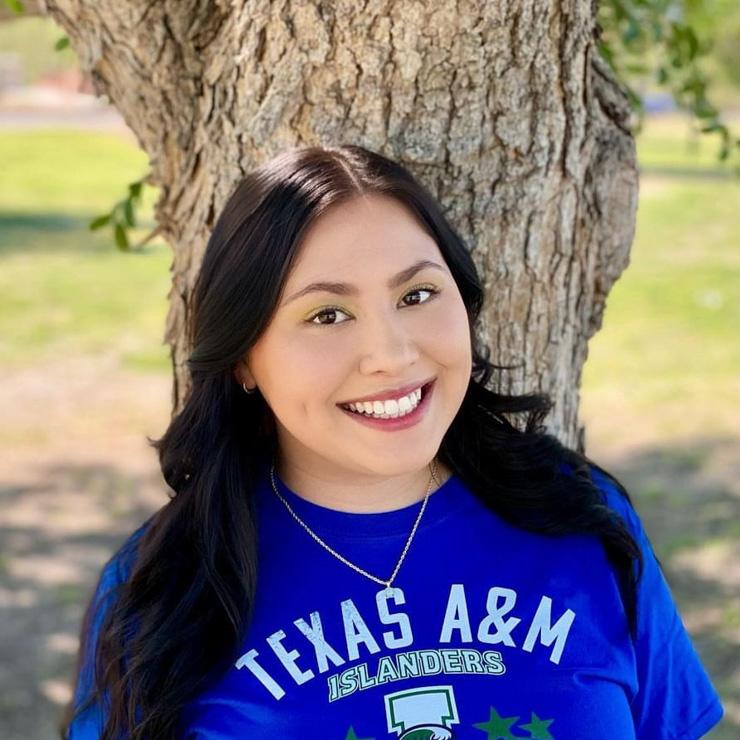


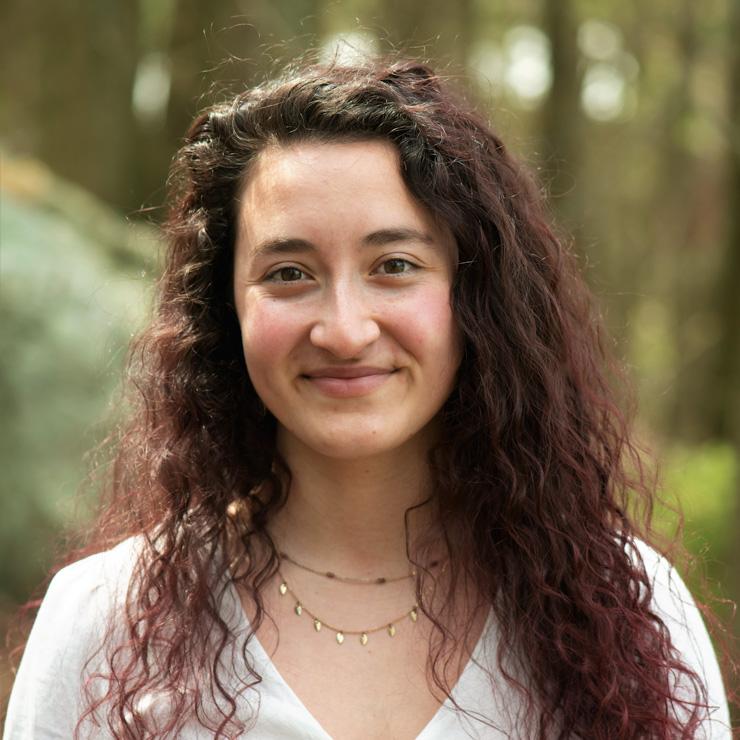


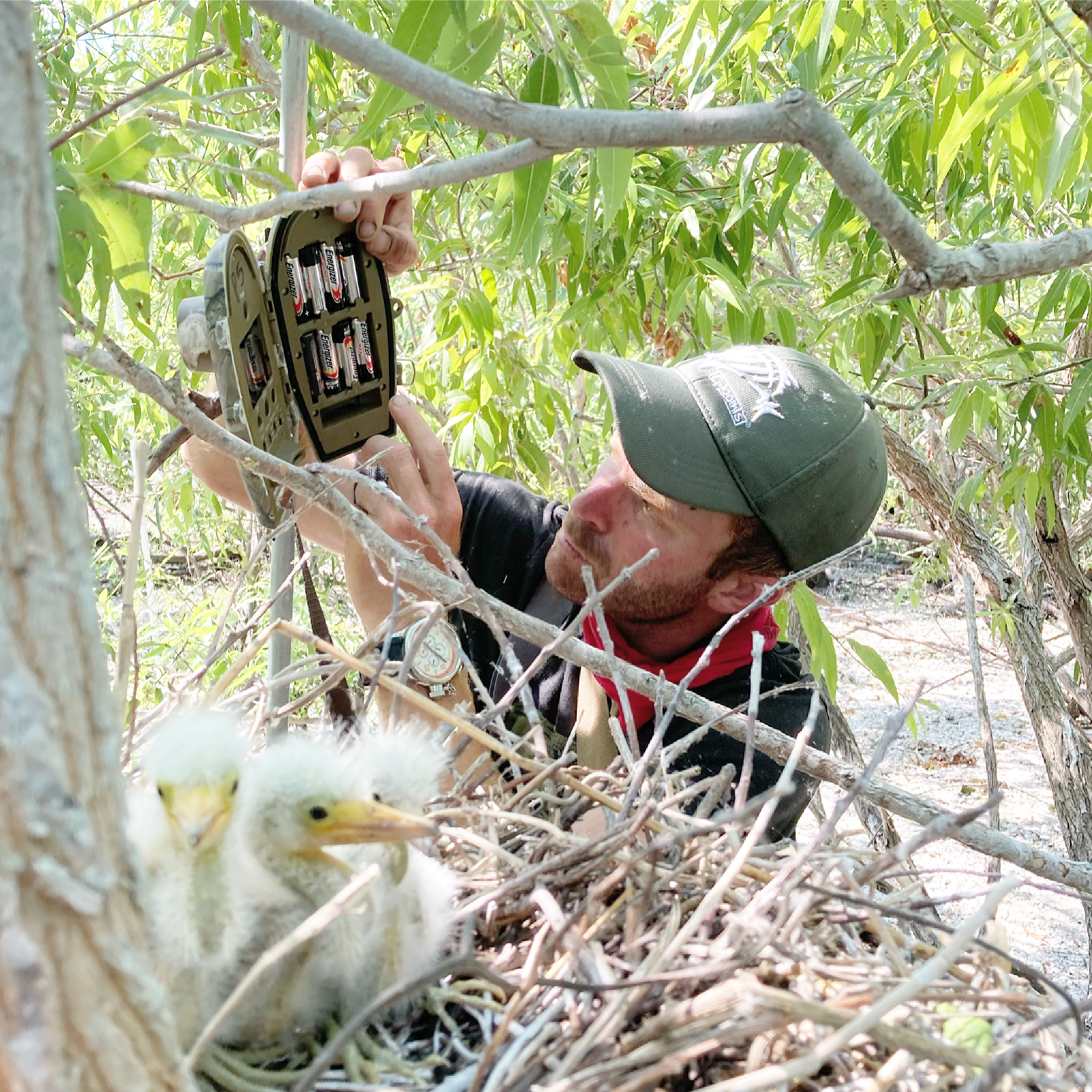
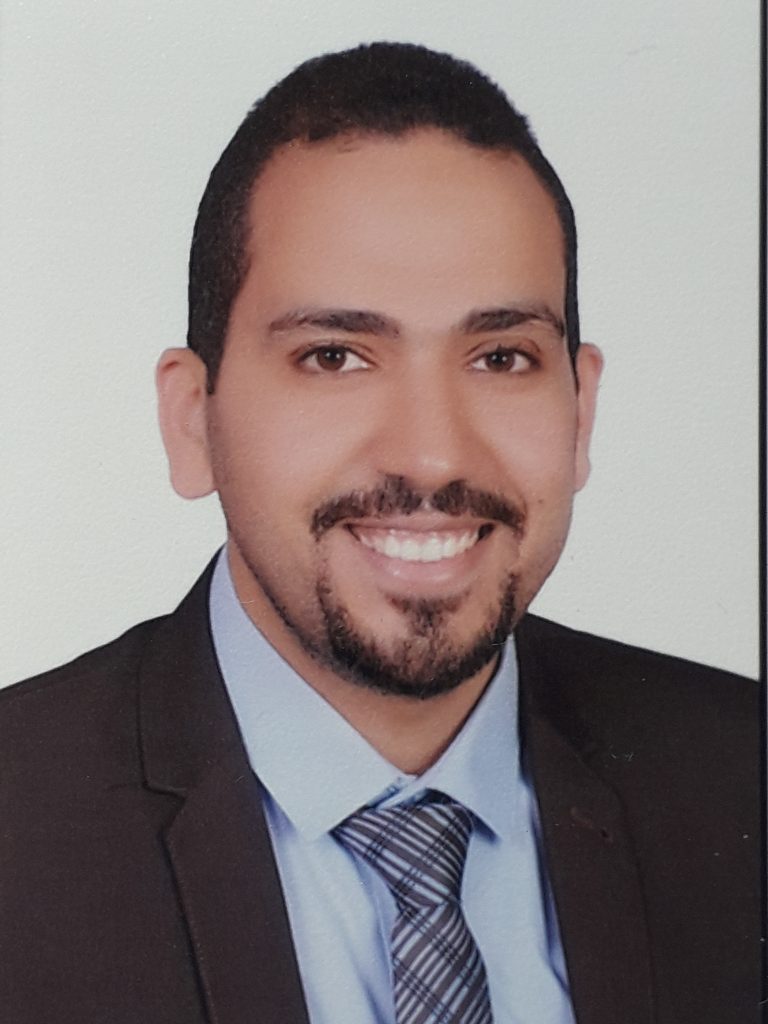
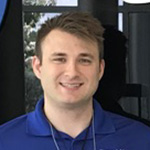
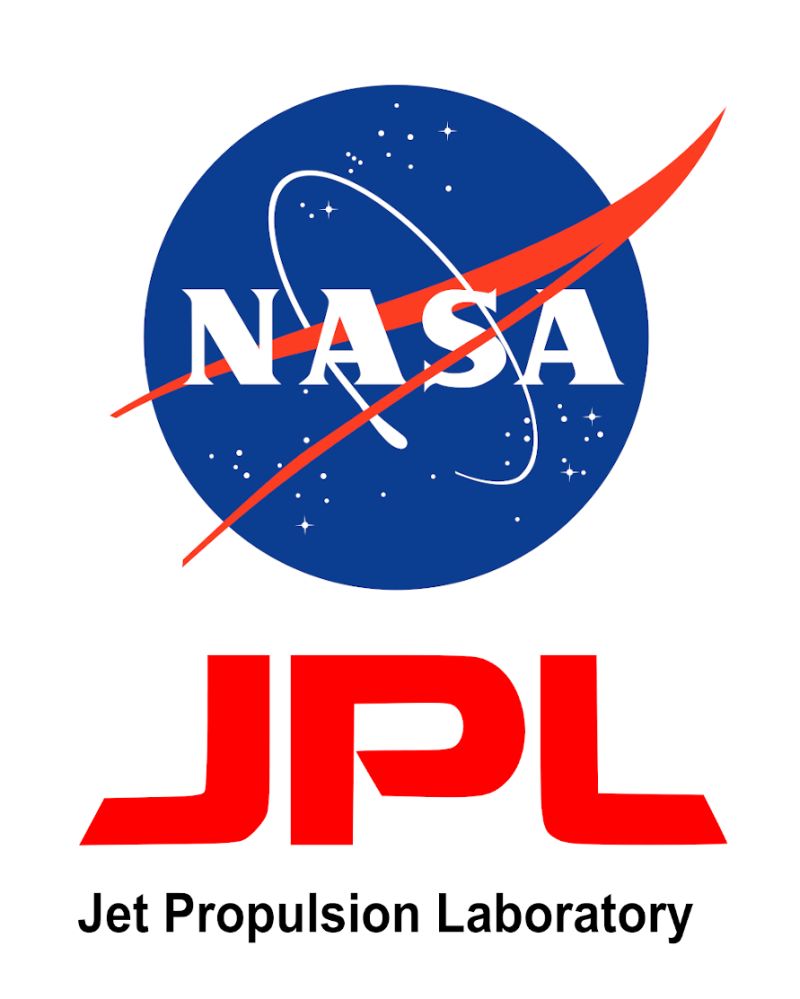 August 2022 Recent graduate Dr. Kevin Nelson (faculty advisor: Feiqin Xie) was awarded a NASA Postdoctoral Program (NPP) Fellowship to work with Chi Ao at the Jet Propulsion Laboratory in Pasadena, CA, where Dr. Nelson will continue his research on GNSS radio occultation, atmospheric boundary layers, and tropical cyclones.
August 2022 Recent graduate Dr. Kevin Nelson (faculty advisor: Feiqin Xie) was awarded a NASA Postdoctoral Program (NPP) Fellowship to work with Chi Ao at the Jet Propulsion Laboratory in Pasadena, CA, where Dr. Nelson will continue his research on GNSS radio occultation, atmospheric boundary layers, and tropical cyclones.
Summer 2022 Drs. Bimal Gyawali (faculty advisor: Dr. Dorina Murgulet), Coral Lozada (faculty advisor: Dr. David Yoskowitz), and Kevin Nelson (faculty advisor: Dr. Feiqin Xie) (first row) and MS Jordana Cutajar (faculty advisor: Dr. Michael Wetz) and EvaLynn Jundt (faculty advisor: Dr. Xinping Hu) (second row) successfully defended their doctoral dissertations and master's theses to graduate from the CMSS program at Texas A&M University - Corpus Christi. Congratulations for the achievements and good luck with your future endeavors!

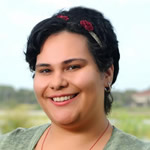

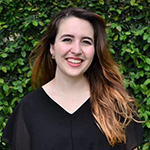

May 16 CMSS program welcomes new MS student Skylar Meehan and new PhD student Kelley Savage.

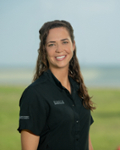
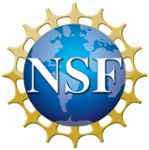 May 2022 A National Science Foundation Research Traineeship (NRT) project grant was awarded to Drs. Dorina Murgulet (PI), Xinping Hu (co-PI), Chuntao Liu (co-PI), Jennifer Pollack (co-PI), and Philipe Tissot (co-PI). This NRT project will train students from groups traditionally underrepresented in STEM fields of study to be part of a diverse workforce of interdisciplinary environmental scientists capable of harnessing the data revolution (HDR) for Stakeholder-Guided Environmental Science (STAGES). Coastal climate change is a grand challenge and there is a need to generate actionable new knowledge and solutions to address this challenge using convergent approaches. The CMSS program will house the STAGES program and offer a convergent training experience. This experience will connect innovative research to practitioner and community needs to answer stakeholder-guided questions of national concern. The project anticipates training up to forty (40) Master's and Ph.D. students, including twenty-one (21) funded trainees from the TAMU-CC's CMSS program, over four years.
May 2022 A National Science Foundation Research Traineeship (NRT) project grant was awarded to Drs. Dorina Murgulet (PI), Xinping Hu (co-PI), Chuntao Liu (co-PI), Jennifer Pollack (co-PI), and Philipe Tissot (co-PI). This NRT project will train students from groups traditionally underrepresented in STEM fields of study to be part of a diverse workforce of interdisciplinary environmental scientists capable of harnessing the data revolution (HDR) for Stakeholder-Guided Environmental Science (STAGES). Coastal climate change is a grand challenge and there is a need to generate actionable new knowledge and solutions to address this challenge using convergent approaches. The CMSS program will house the STAGES program and offer a convergent training experience. This experience will connect innovative research to practitioner and community needs to answer stakeholder-guided questions of national concern. The project anticipates training up to forty (40) Master's and Ph.D. students, including twenty-one (21) funded trainees from the TAMU-CC's CMSS program, over four years.
STAGES will generate new knowledge: (1) from big data at the nexus of land-water-atmospheric connections to understand complex processes driving coastal environmental systems, and (2) regarding the integration of stakeholders and big data into academic research in ways that boost trainee involvement in convergent research and occupational readiness. CMSS faculty's long-standing relationships with stakeholders will be used for a new training model that is sustainable and scalable. This model will co-develop research projects suitable for trainee teams to tackle using Machine Learning (ML) methods. Stakeholders include government agencies on all levels, non-governmental organizations, and community groups, with a common goal to improve the resiliency of Gulf Coast communities and environment. STAGES will provide a curricular foundation for convergent environmental science that is data intensive, starting each spring with coursework and a week-long field trip to experience the interaction of land-water-atmospheric events firsthand. Late Spring Stakeholder Workshops pair trainees and stakeholders to formulate data-focused research questions. Summer Big Data Blitzes prepare trainees for team efforts to answer questions, culminating in Fall Capstones to refine and communicate research results. Trainees will benefit from an interdisciplinary cadre of deeply experienced faculty researchers with extensive field, data science, and student training experience. Anticipated findings are expected to include best practices for engaging stakeholders to identify data-intensive challenges and co-develop research questions; assimilation of the challenges by trainees with various backgrounds; and identification of problems appropriate for the trainees' different fields of study. During the training process, trainees will become better science communicators who can engage stakeholders and grasp the ethical dimensions of their decisions for long-term collaborations. STAGES will establish and disseminate transformative STEM training, research, and evaluation advances in coastal and marine system science that produce a sustainable and scalable graduate education model.
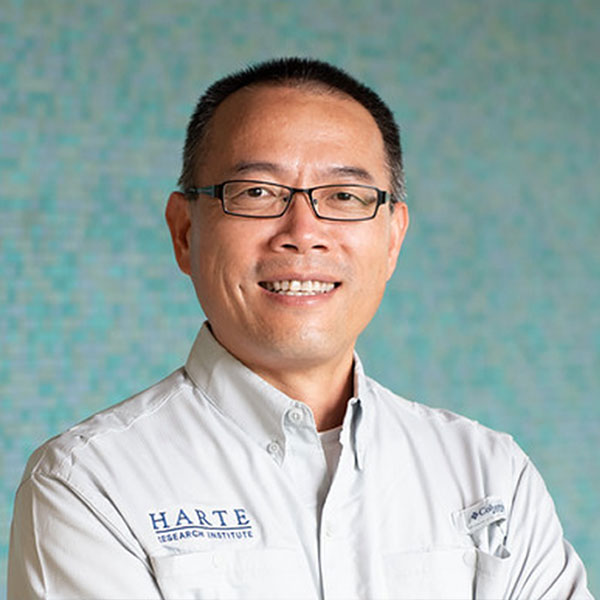
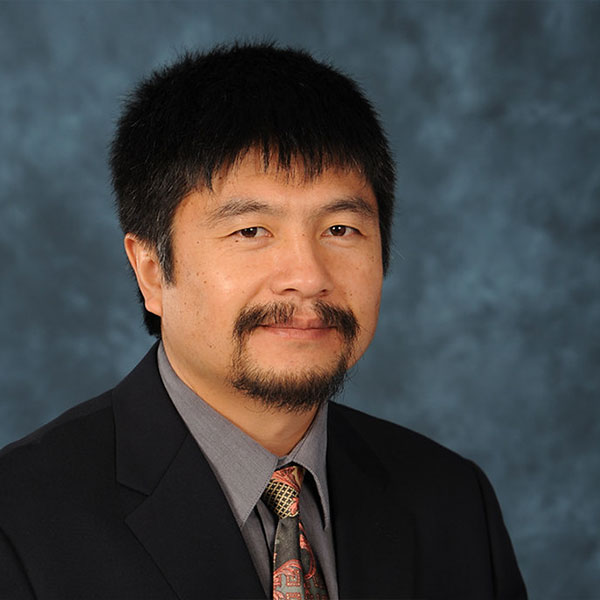
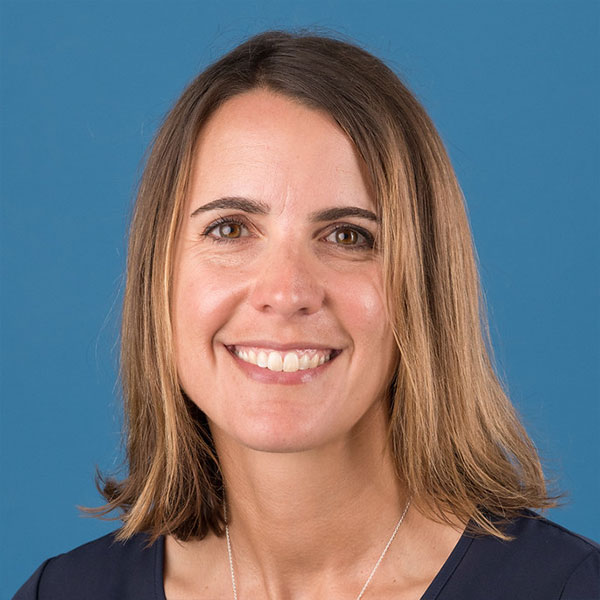
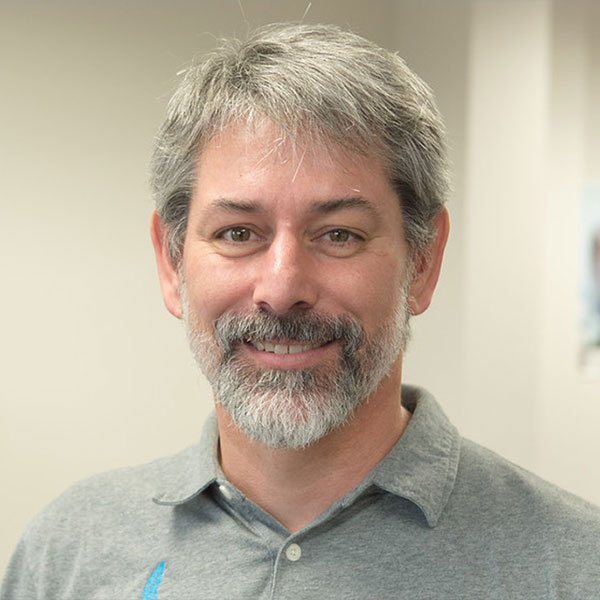
Spring 2022 Drs. Lindsey Hayden (faculty advisor: Dr. Chuntao Liu), Hao Yu (faculty advisor: Dr. Richard Coffin), and Xue Feng (faculty advisor: Dr. Toshiaki Shinoda) (first row) and MS Lexie Neffinger (faculty advisor: Dr. Jennifer Pollack), Lily Walker (faculty advisor: Dr. Michael Wetz), and William Wolfe (faculty advisor: Dr. Dorina Murgulet) (second row) successfully defended their doctoral dissertations and master's theses to graduate from the CMSS program at Texas A&M University - Corpus Christi. Congratulations for the achievements and good luck with your future endeavors!
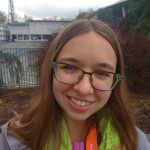
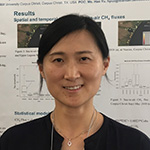
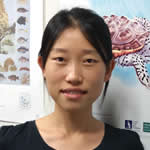
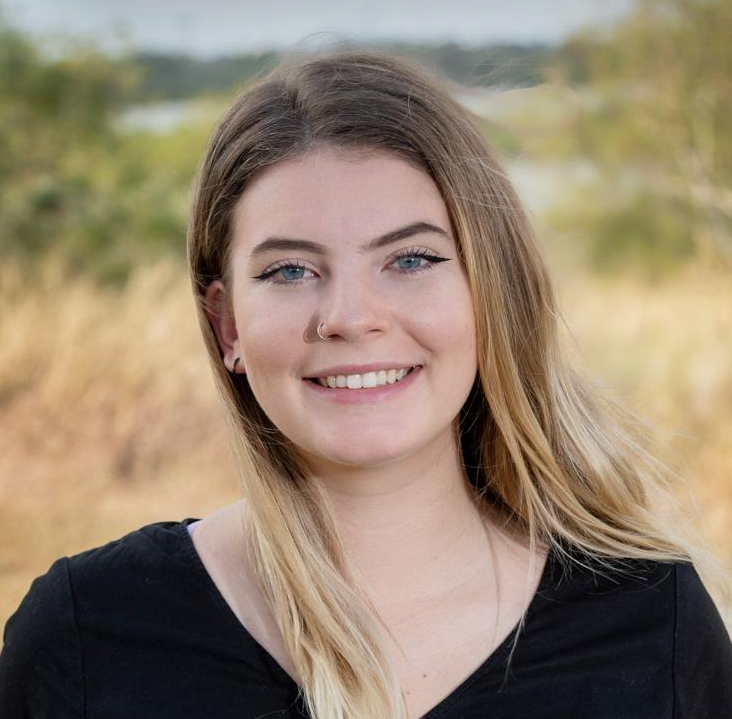
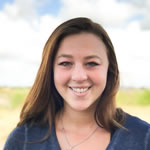
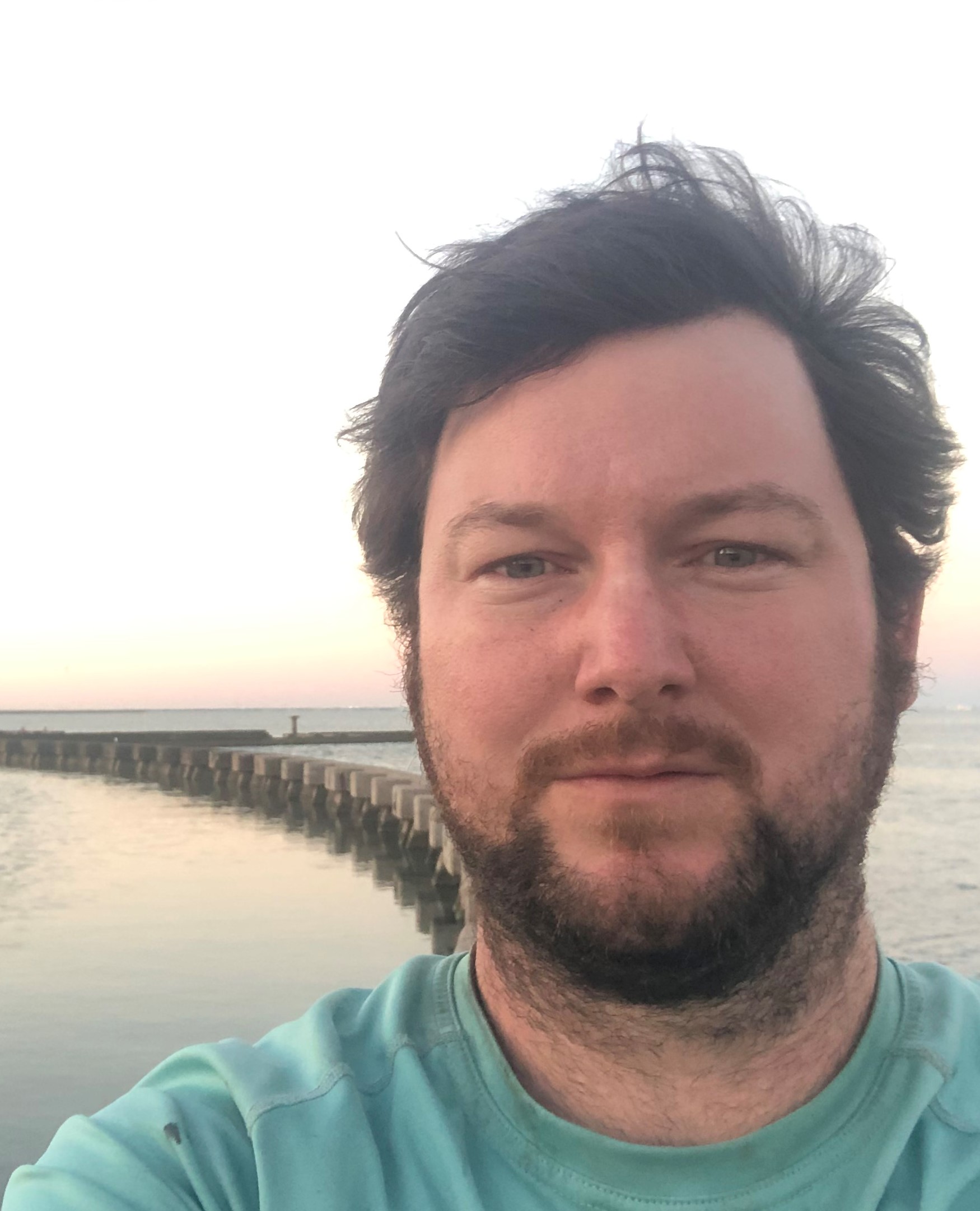
January 16 CMSS program welcomes new PhD student Miranda White.

2021
October 1 Collaborative Research: Gas Hydrate Contribution to the Ross Sea Carbon Budget; Shallow Sediment to Water Column; Present and Future
PI: Dr. Richard Coffin, Texas A&M – Corpus Christi, NSF ID 000665402
Co-PI: Dr. Ingo Pecher, Texas A&M – Corpus Christi, NSF ID 000831516
Co-PI: Dr. Wade Jeffrey, University of West Florida, NSF ID 000242993
Co-PI: Dr. Nathan Bangs, University of Texas, NSF 000088836
Co-PI: Dr. Brandi Kiel Reese, Texas A&M – Corpus Christi, NSF ID 000688162
Understanding Earth warming requires significant insight on chemical and biological cycles in both polar regions and many environments in between. This study will serve as groundwork for future research in ocean carbon models and interpretation of past paleo-oceanographic cycles (Figure 1). Methane is studied because it is abundant in ocean sediments and can be a significant source of carbon dioxide with approximately 25 times greater heat absorption than carbon dioxide. While the Arctic has been primary Earth climate change focus, the Antarctic including the Ross Sea, has vast reservoir of carbon and has been recognized to have an extensive bottom ocean layer – sediment interface that is one of the most rapidly warming regions on Earth. Here, plans are presented to study a possible extensive gas hydrate reservoir in Ross Sea sediment and determine climate change could be influencing region. Our emphasis on the Ross Sea is supported with recent studies which show paleo-dynamics driven by temperature and sea level. This large carbon reserve appears to be sealed in the form of gas hydrate as evidenced by key seismic data including patterns that suggest the methane could be from a petroleum source. This indication of warming and ice melting coupled with high thermogenic gas hydrate loadings suggest the Ross Sea is an essential environment to determine contributions of current day and potential future methane, petroleum, and glacial carbon to shallow sediment and water column carbon cycles. Comparison of carbon source(s) and cycling will include phytoplankton, glacier ice, shallow sediment carbon, and deep sediment oil, and methane trapped in gas hydrates. Data collection will include seismic profiling, broad geochemical data, and geo-microbiology parameters. Data obtained will provide a new understanding of climate change and the effect on the ocean carbon budget. Planning is three years with field work in the Ross Sea conducted twice; December/January 2022/2023 and February/April 2024.
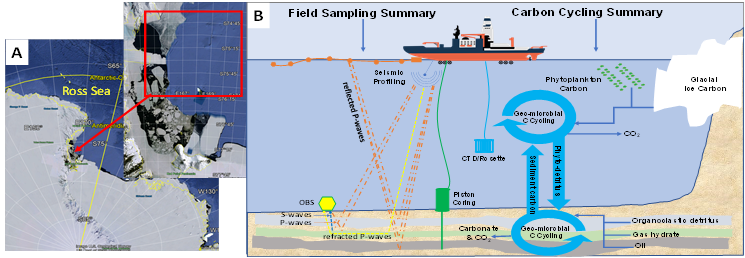
Fig. 1: A) Ross Sea focus region located through previous seismic surveys. B) Overview of field sampling proposed to be conducted in the Ross Sea. Field sampling will include seismic data, piston coring, and water column sampling. Survey of carbon cycling is in water column and shallow sediment to determine gas hydrate, oil, phytoplankton and glacial ice contributions to sediment and water column carbon cycling. Levels contributed will be based on stable carbon isotope (d13C) and radiocarbon isotope (D14C) analysis of carbon pools, concentrations, and geo-microbial turnover rates.
We bring together an outstanding team of experts in geophysics, geochemistry, ocean chemistry, geomicrobiology and isotope geochemistry. With global recognition of climate change there is need for uniform, thorough assessment across the Earth to develop adequate understanding. With this accomplishment there will be a provision of a data baseline of our current condition and provide capability to assess current and future anthropogenic influence on the natural cycle. Focus is on a remote understudied location that is necessary for evaluation of the Earth. Education related to Earth warming requires thorough provision of information through all academic levels, government and the public. Our project will fund 4 graduate students and support the training of undergraduate researchers. Results will be disseminated internationally to non-scientific audiences through field blogs, PI Websites, numerous education and outreach activities, as well as being incorporated into graduate and undergraduate courses. Additionally, this project will provide training and support for undergraduate, graduate, and early career researchers at a Hispanic Serving Institution. This proposal requires fieldwork in the Antarctic.
September 10 - October 19 Eva Jundt participated in a Gulf wide cruise - the Gulf of Mexico Ecosystem and Carbon Cruise (GOMECC-4) on board R/V Ron Brown.
September 1 Larissa Dias received NOAA Ocean Acidification/Sea Grant Fellowship.
August 23 CMSS program welcomes 5 new MS students - (row 1, from left) Neina Chapa, Jennifer Gilmore, Molly Mcguigan (not pictured), Magkena Szemak, and Erin Taylor, and 7 new PhD students - (row 2, from left) Ramadan Gamal Abouelmagd Abdelrehim, Natalia Alekseeva, Antonio Cantu de Leija, Shankar Narasimha Harinarasimha Prasad, (row 3, from left) Florian Morvais, Youwen Wang, and Yuting Xiao.
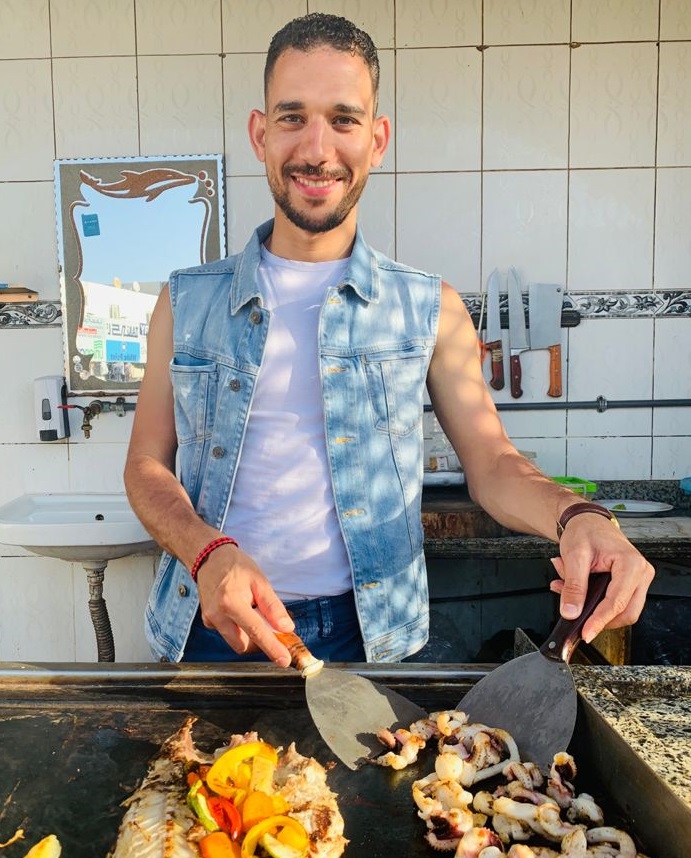
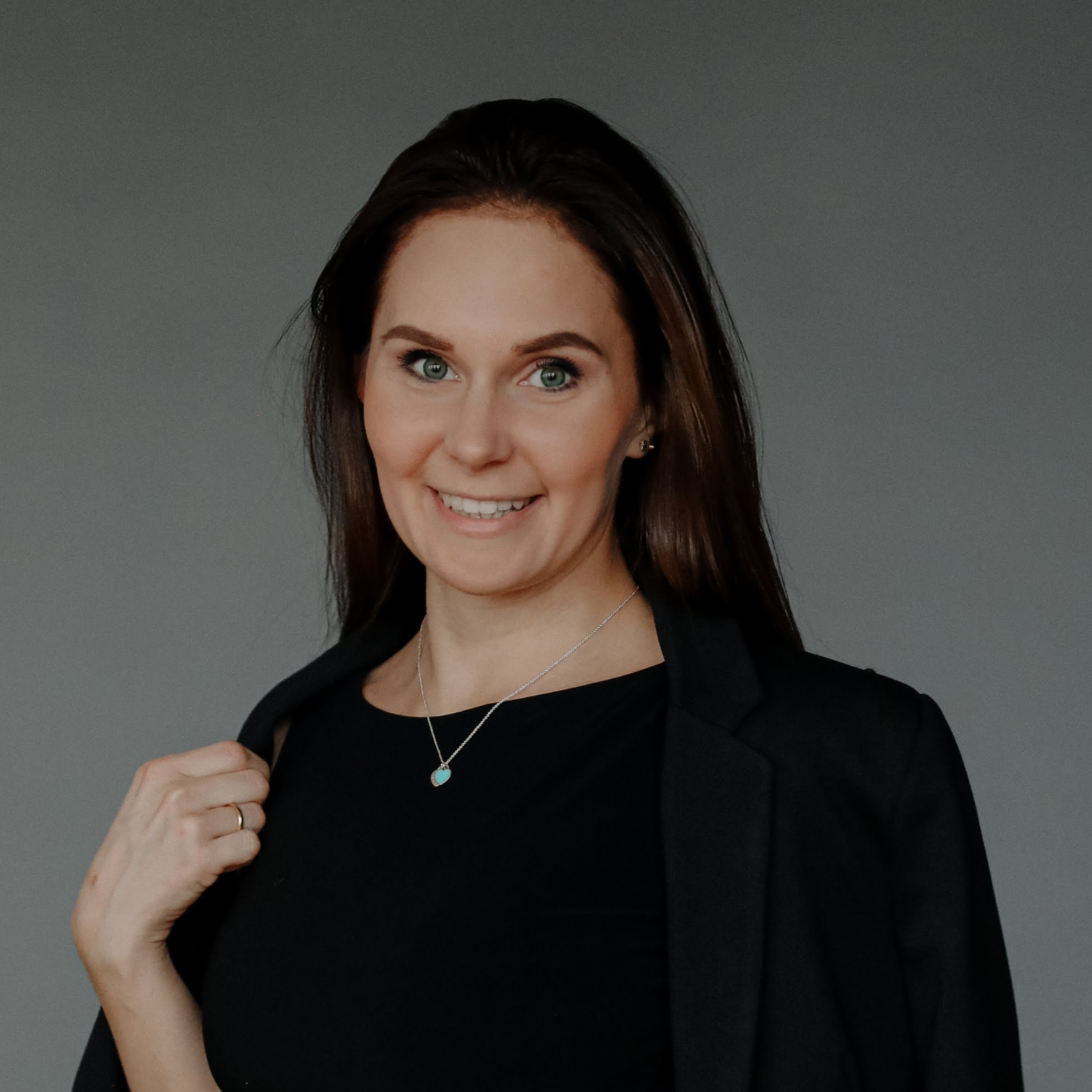

August 2021 Drs. Diana Del Angel (faculty advisor: Dr. David Yoskowitz) and Terry Palmer (faculty advisor: Dr. Jennifer Pollack) graduate from the CMSS program at Texas A&M University - Corpus Christi. Congratulations for the achievements and good luck with your future endeavors!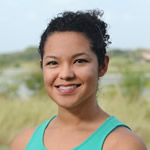
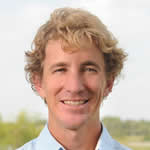
July - August 2021 TAMU-CC hosts a workshop lead by Dr. Chuntao Liu to train students how to launch ozonesondes. Read the full story here: https://www.tamucc.edu/news/2021/08/081321-cose-atmospheric-science-dr-liu-ozonesonde-workshop-081321.php
The workshop was conducted as part of the Dynamics and Chemistry of the Summer Stratosphere (DCOTSS) field campaign, a NASA project designed to measure the impact of strong storms on the chemical composition of the stratosphere using a high altitude aircraft. The intensive operation period is scheduled for the summer of 2021 and 2022. TAMU-CC students and faculty collaborated with researchers from other universities to collect these data via balloon launches as well as providing weather forecasting and flight planning necessary for the operation of the aircraft.
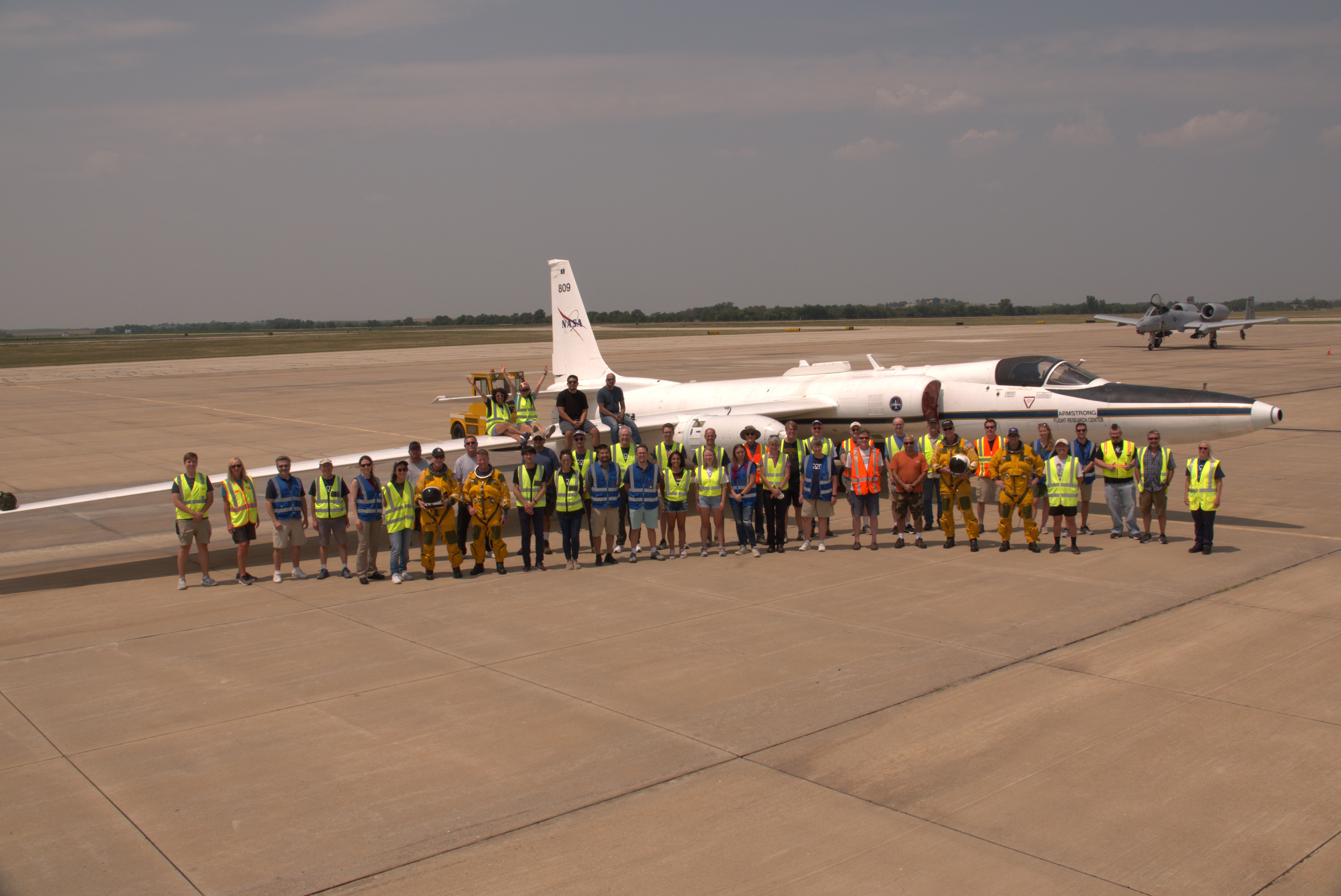
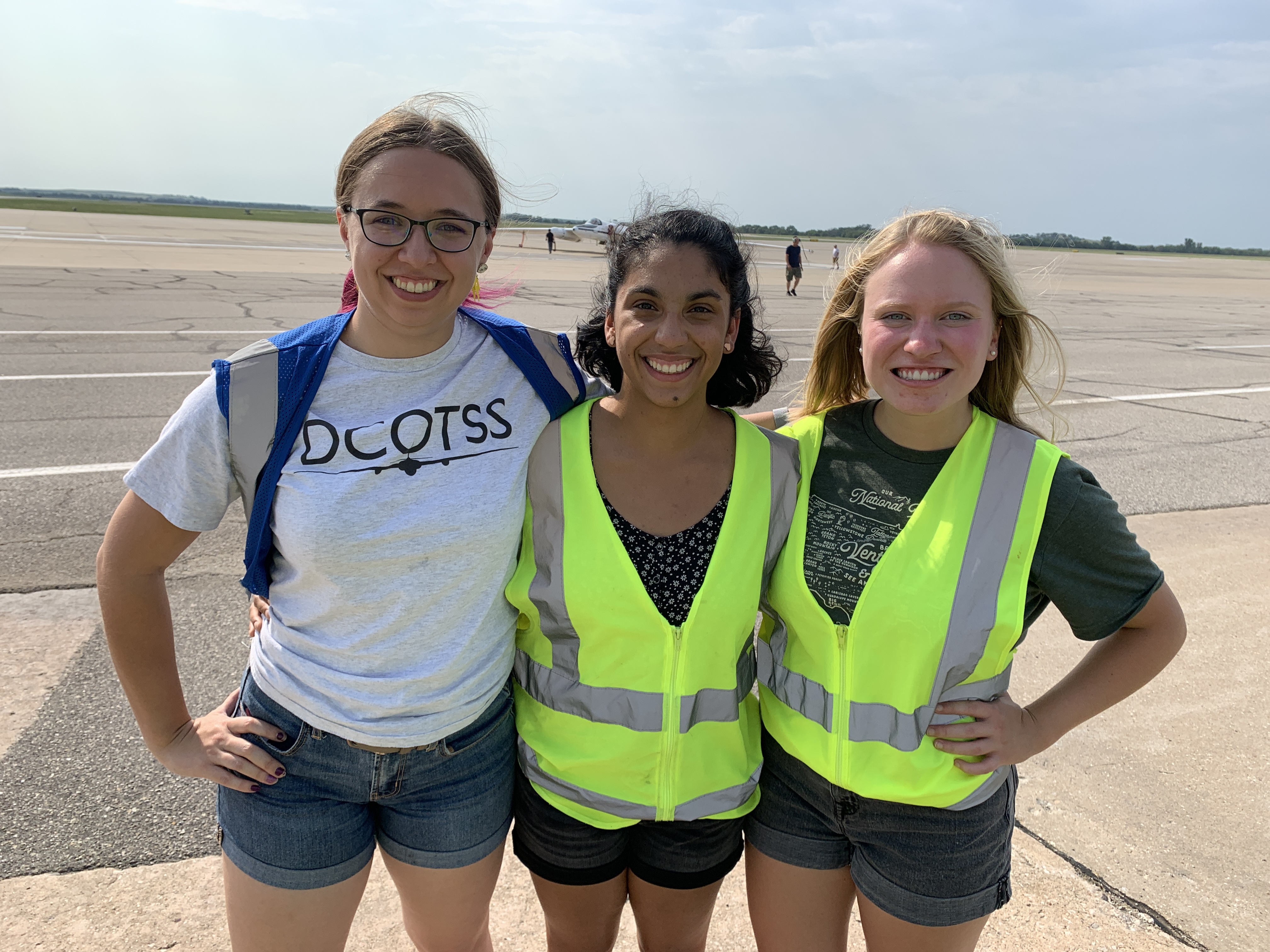
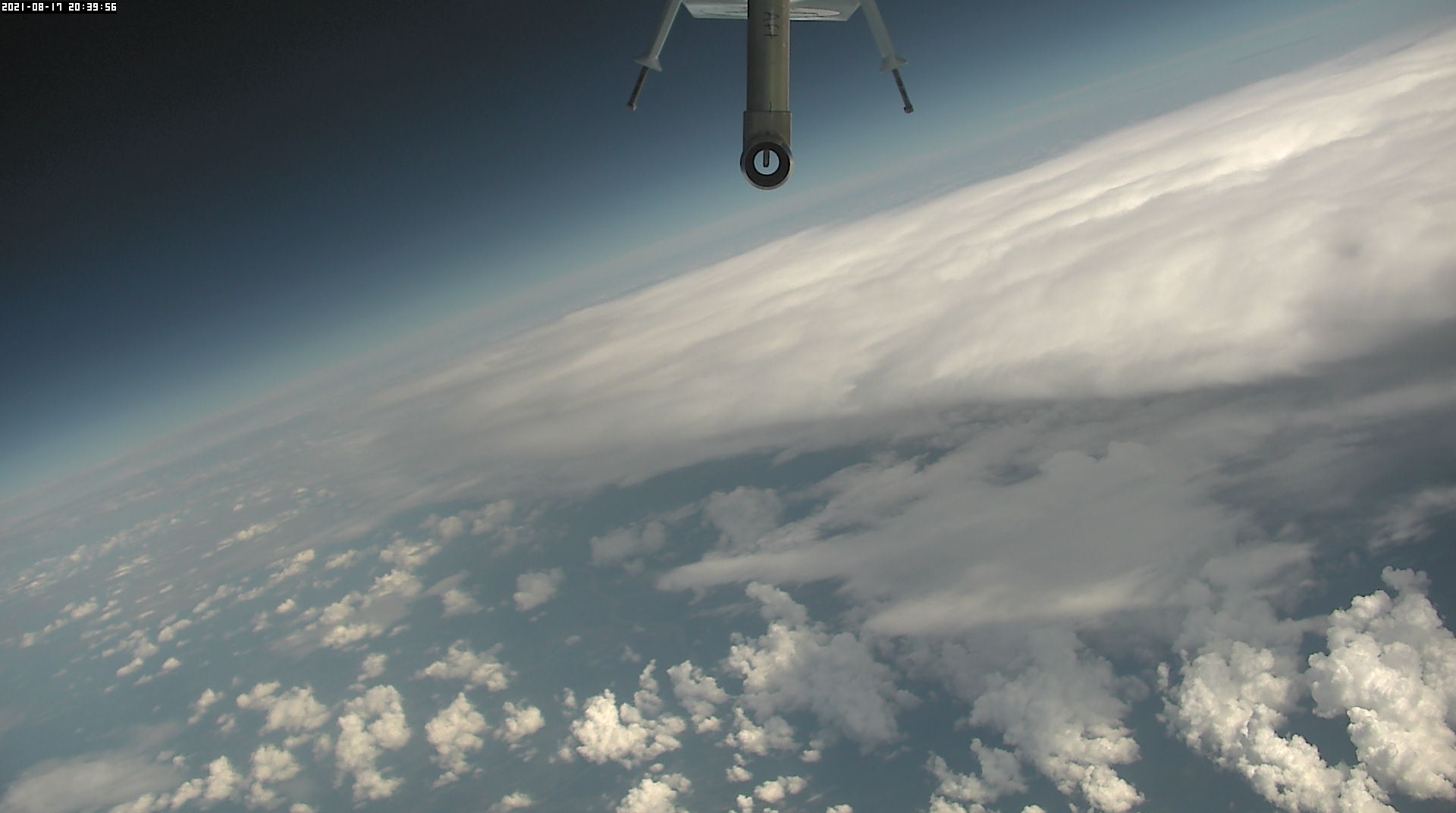
May 2021 Drs. Mohammad Barzegar-Paiin-Lamouki (faculty advisor: Dr. Darek Bogucki) and Melissa McCutcheon (faculty advisor: Dr. Xinping Hu) graduate from the CMSS program at Texas A&M University - Corpus Christi. Congratulations for the achievements and good luck with your future endeavors!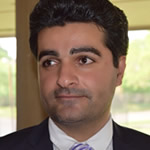
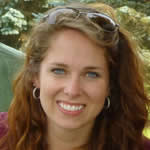
January 29 The Society of Exploration Geophysicists (SEG) recently funded Dr. Mohamed Ahmed to study the parched landscape of one of the most arid regions in the world in search for water resources. Using geophysical technology the team will map a new fresh groundwater source for an Egyptian Bedouin community. The story is featured here: https://www.tamucc.edu/news/2021/01/012921-egyptian-water.php
Congratulations!!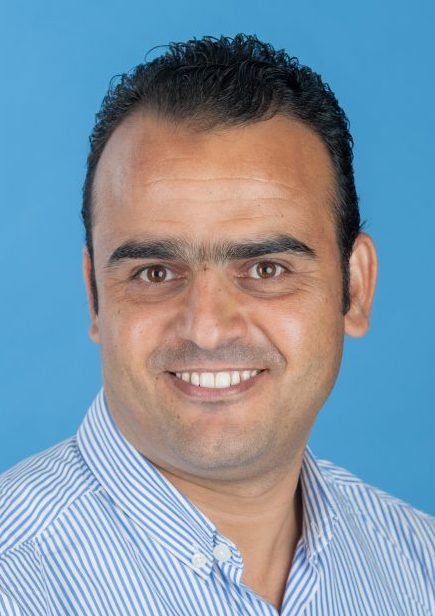
2020
December 2020 Dr. Audrey Douglas (faculty advisor: Dr. Dorina Murgulet) and MS Ryan Turner (faculty advisor: Dr. Mohamed Ahmed) graduate from the CMSS program at Texas A&M University - Corpus Christi. Congratulations for the achievements and good luck with your future endeavors!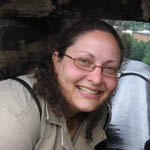
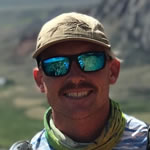
December 18 Congratulations to our own Ryan Turner, graduate research assistant (faculty advisor: Dr. Mohamed Ahmed), on his recognition as a Fall 2020 Outstanding Graduate for the College of Science and Engineering!!!
Outstanding Graduate Ryan Turner Follows His Passion for Coastal Bend Geology, Geophysics
September 29 Dr. Dorina Murgulet and Dr. Hussain Abdulla were funded by the National Science Foundation to study the impact of flooding on groundwater quality following natural disasters such as Hurricane Hanna.
August 2020 Drs. Sajjad Abdullajintakam (faculty advisor: Dr. Richard Coffin) and Emily Cira (faculty advisor: Dr. Michael Wetz) graduate from the CMSS program at Texas A&M University - Corpus Christi. Congratulations for the achievements and good luck with your future endeavors!
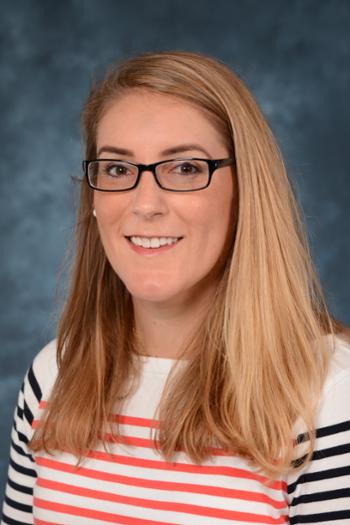
June 30 Texas Sea Grant fund nearly $50,000 to 19 Texas A&M System graduate students (https://geonews.tamu.edu/news/2020/06/gia-2020-2022), including four of our own (pictured in order from left to right):
- Bimal Gyawali (advisor Dorina Murgulet) - Estimation of groundwater discharge variability to the Gulf of Mexico using GRACE satellite and field observations
- Lexie Neffinger (advisor Jennifer Pollack) - Assessing biotic integrity for tidal streams along the South Texas Coast
- Chris Vickers (advisor Dorina Murgulet) - Groundwater contribution of elevated nutrients to Laguna Salada, Baffin Bay
- Will Wolfe (advisor Dorina Murgulet) - Quantifying submarine groundwater discharge through continuous, long-term measurements of radon in a semi-arid estuary




May 2020 Drs. Samreen Siddiqui (faculty advisor: Dr. Jeremy Conkle) and Quinn McColly (faculty advisor: Dr. David Yoskowitz) graduate from the CMSS program at Texas A&M University - Corpus Christi. Congratulations for the achievements and good luck with your future endeavors!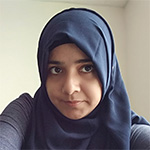
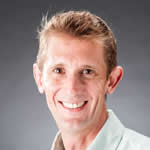
May 2020 PhD candidate, Larissa Dias has been awarded a 1-year GRF in Ocean Acidification from Texas Sea Grant. As part of this fellowship, Larissa will be continuing her studies on the influence river alkalinity inputs have on estuarine alkalinity over time. She will also focus on the biogeochemistry of Mission Aransas Estuary as related to alkalinity consumption. She plans to develop a model of alkalinity consumption for Texas estuaries to help guide stakeholders towards better resource management practices. Congratulations Larissa! We are proud of you!
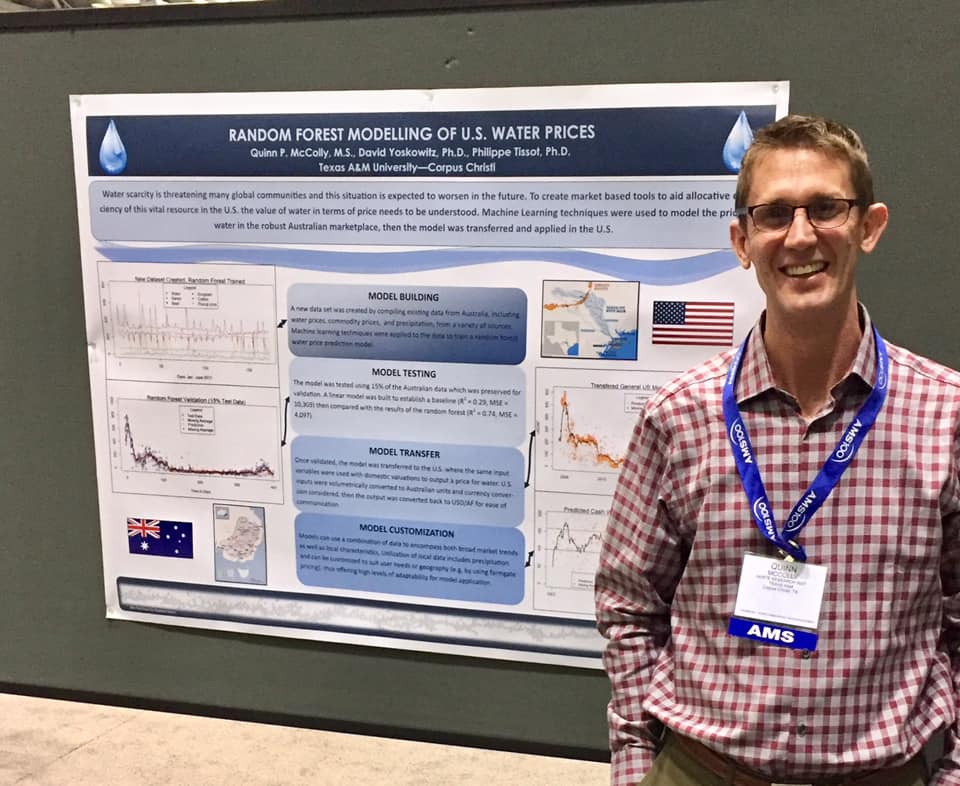 January 12-16 PhD Candidate, Quinn McColly, attends the American Meterological Society (AMS) Conference in Boston, with the help of CMSS travel funds. Quinn is shown below with his poster covering his research into water price modeling.
January 12-16 PhD Candidate, Quinn McColly, attends the American Meterological Society (AMS) Conference in Boston, with the help of CMSS travel funds. Quinn is shown below with his poster covering his research into water price modeling.
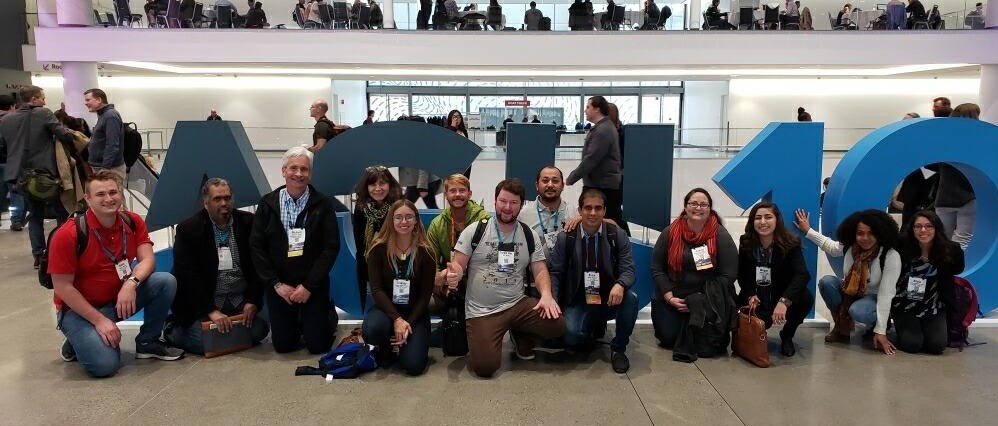
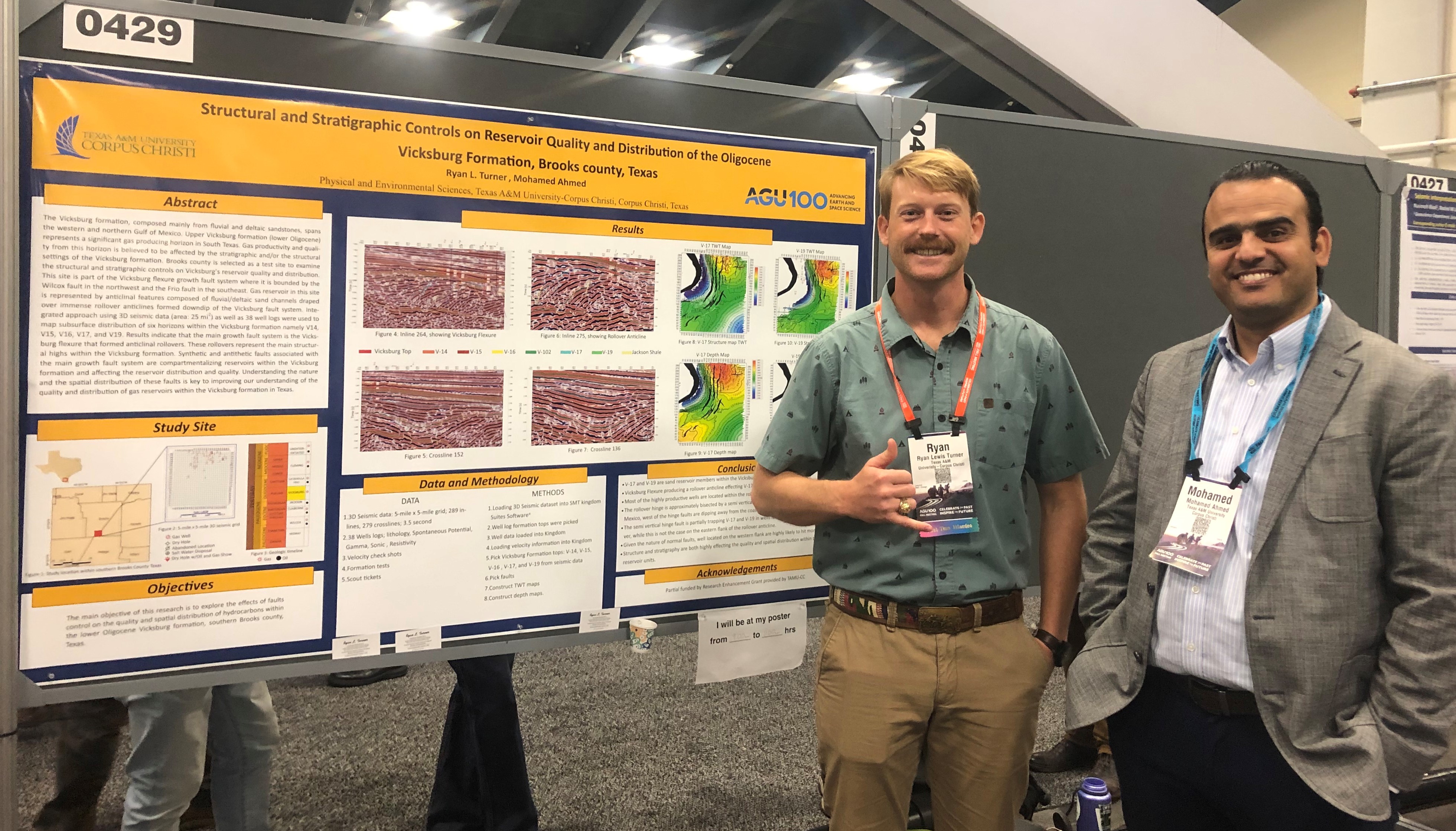 Ryan Turner (MS student) presents his research at the Earth Interior poster session, alongside advisor Dr. Mohamed Ahmed.
Ryan Turner (MS student) presents his research at the Earth Interior poster session, alongside advisor Dr. Mohamed Ahmed.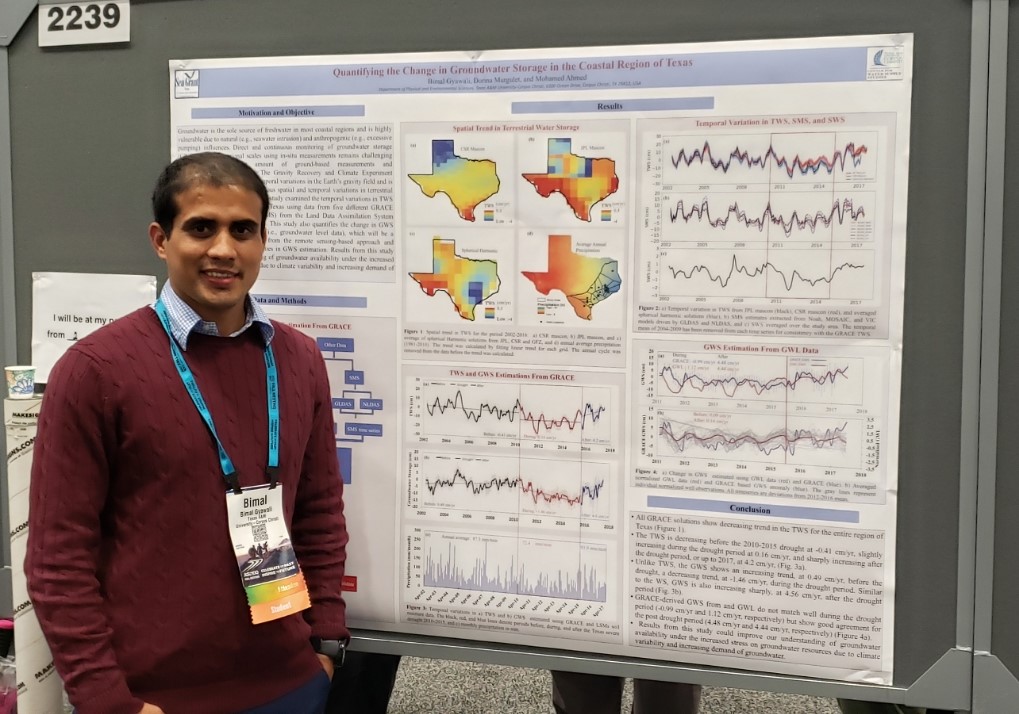 Bimal Gyawali (PhD candidate) presents his poster: "Quantifying the Change in Groundwater Storage in the Coastal Region of Texas".
Bimal Gyawali (PhD candidate) presents his poster: "Quantifying the Change in Groundwater Storage in the Coastal Region of Texas".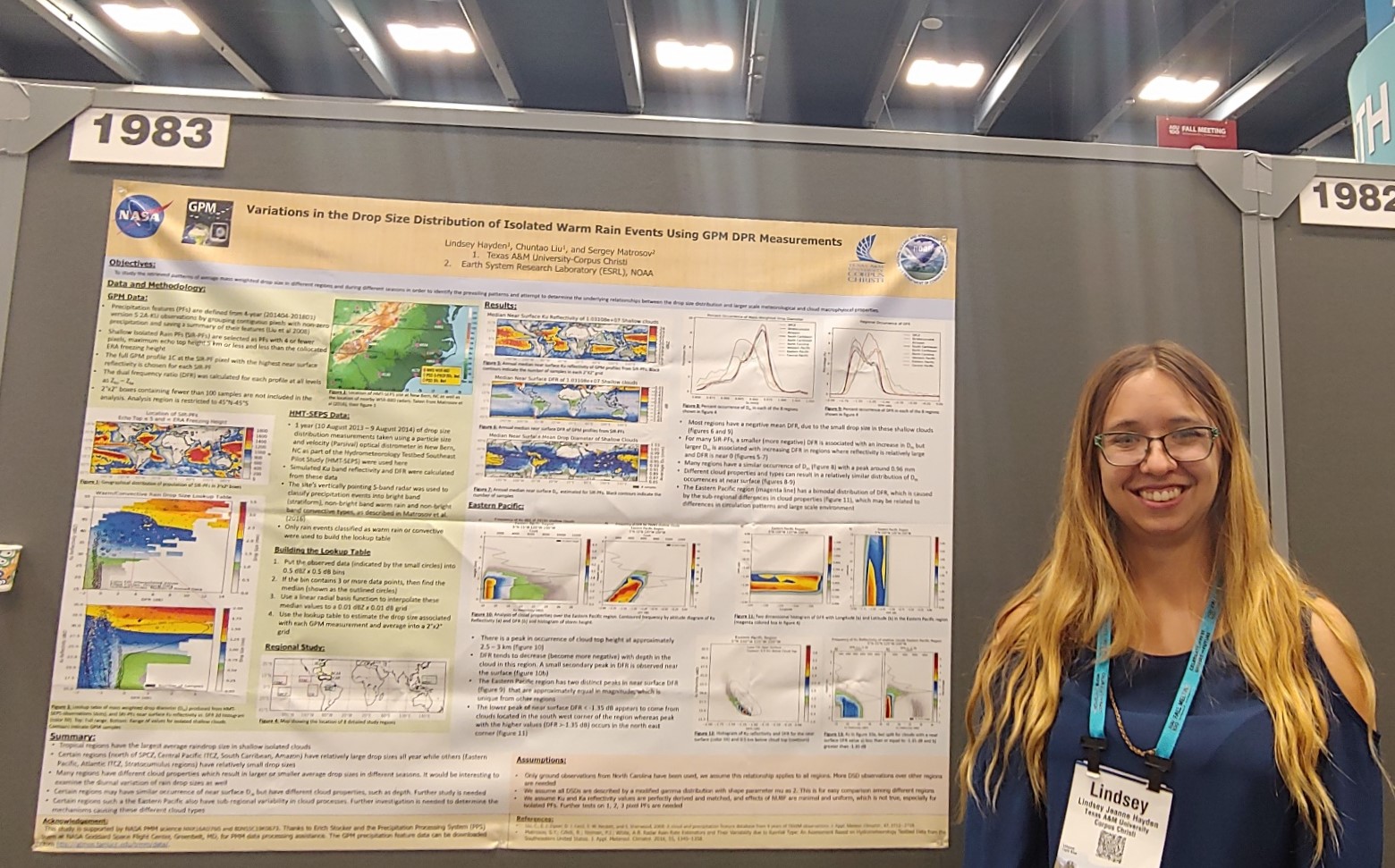 Lindsey Hayden (PhD student) presents her poster at the Atmospheric Sciences session titled, "Variations in the Drop Size Distribution of Isolated Warm Rain Events Using GPM DPR Measurements".
Lindsey Hayden (PhD student) presents her poster at the Atmospheric Sciences session titled, "Variations in the Drop Size Distribution of Isolated Warm Rain Events Using GPM DPR Measurements".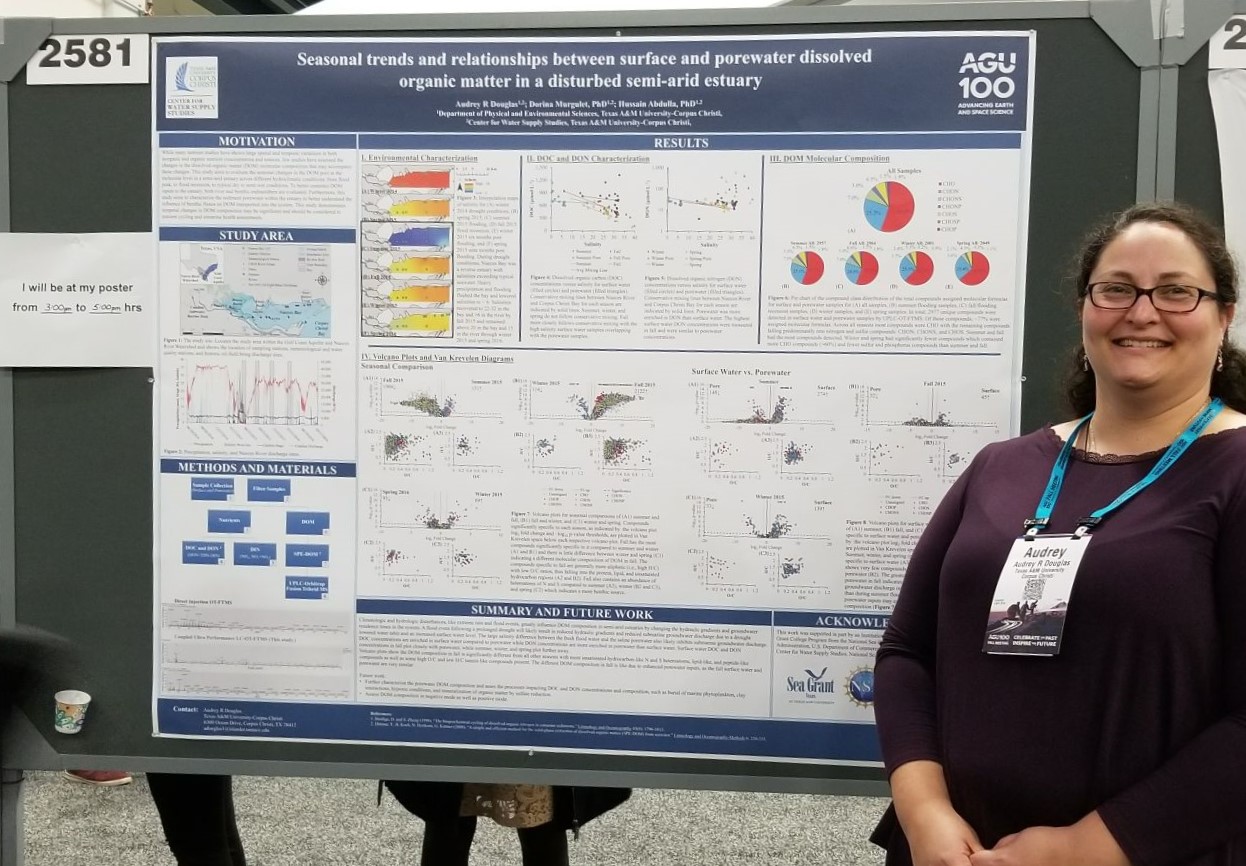 Audrey Douglas (PhD candidate) presents her research into dissolved organic matter at the Biogeosciences poster session.
Audrey Douglas (PhD candidate) presents her research into dissolved organic matter at the Biogeosciences poster session.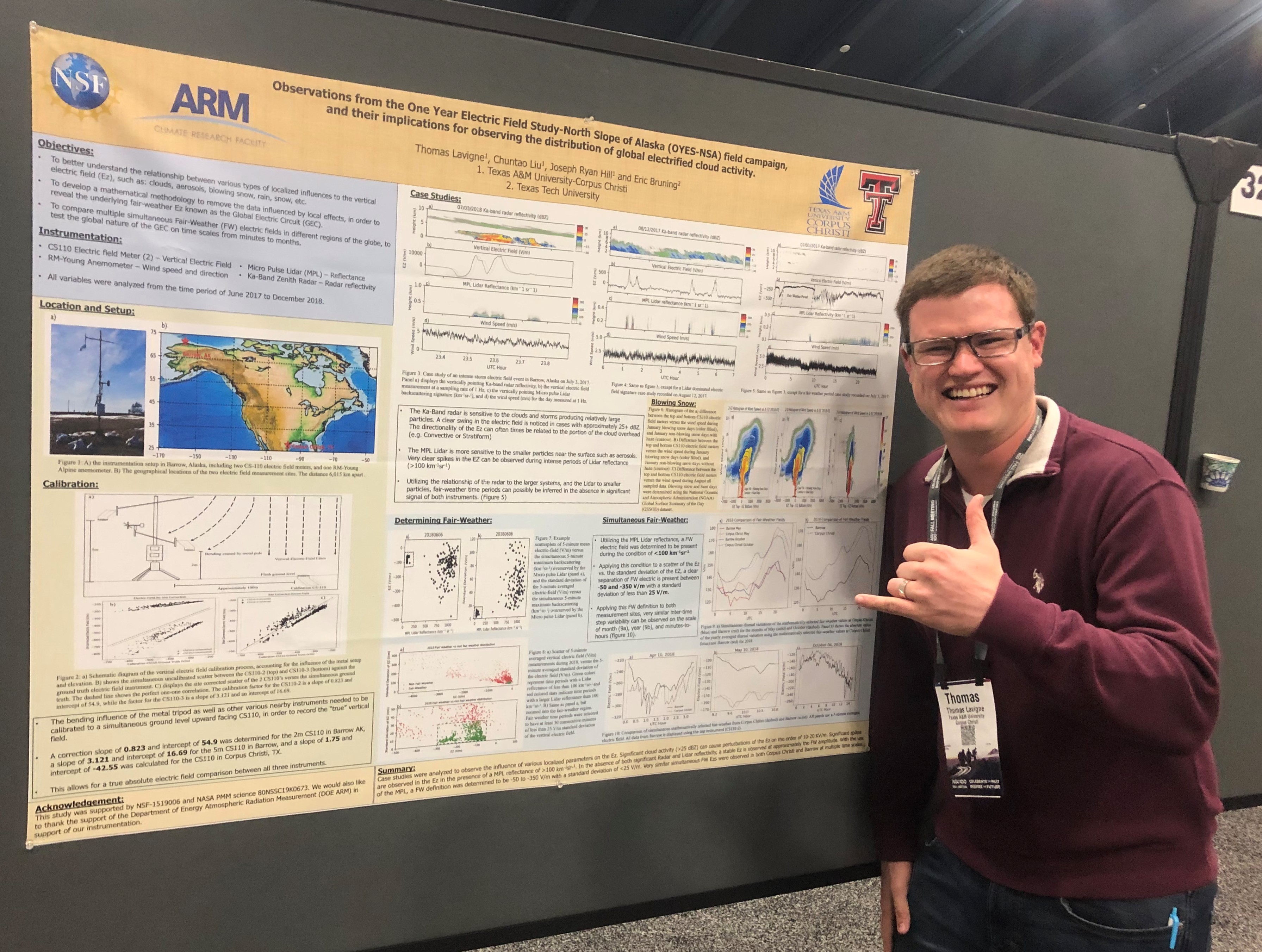 Thomas Lavigne (PhD student) presents his research into electrified cloud activity at the Atmospheric Science poster session.
Thomas Lavigne (PhD student) presents his research into electrified cloud activity at the Atmospheric Science poster session.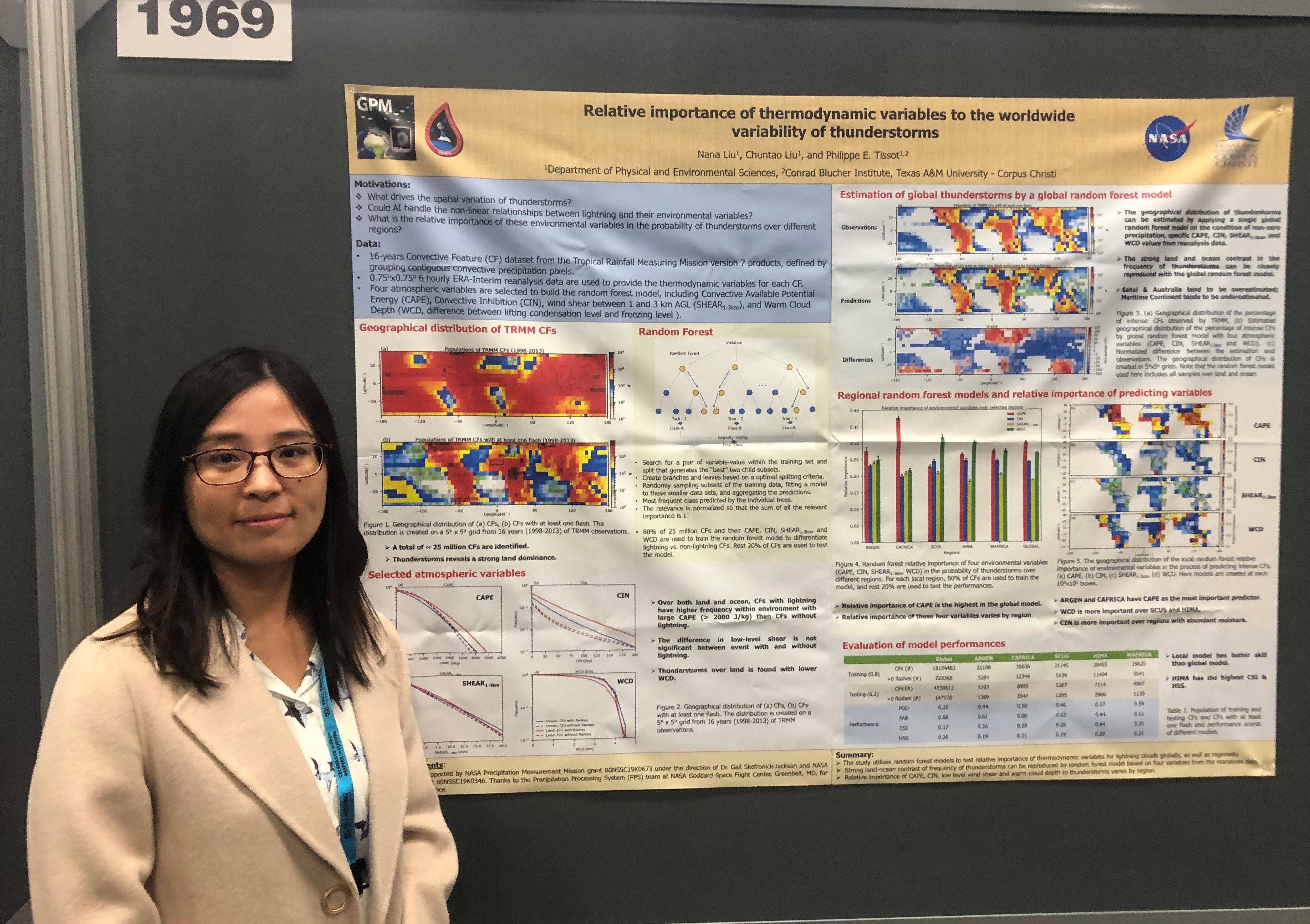 Nana Liu (PhD candidate) presents her research "Relative Importance of Thermodynamic Variables to the Worldwide Variability of Thunderstorms" at the Atmospheric Science session.
Nana Liu (PhD candidate) presents her research "Relative Importance of Thermodynamic Variables to the Worldwide Variability of Thunderstorms" at the Atmospheric Science session.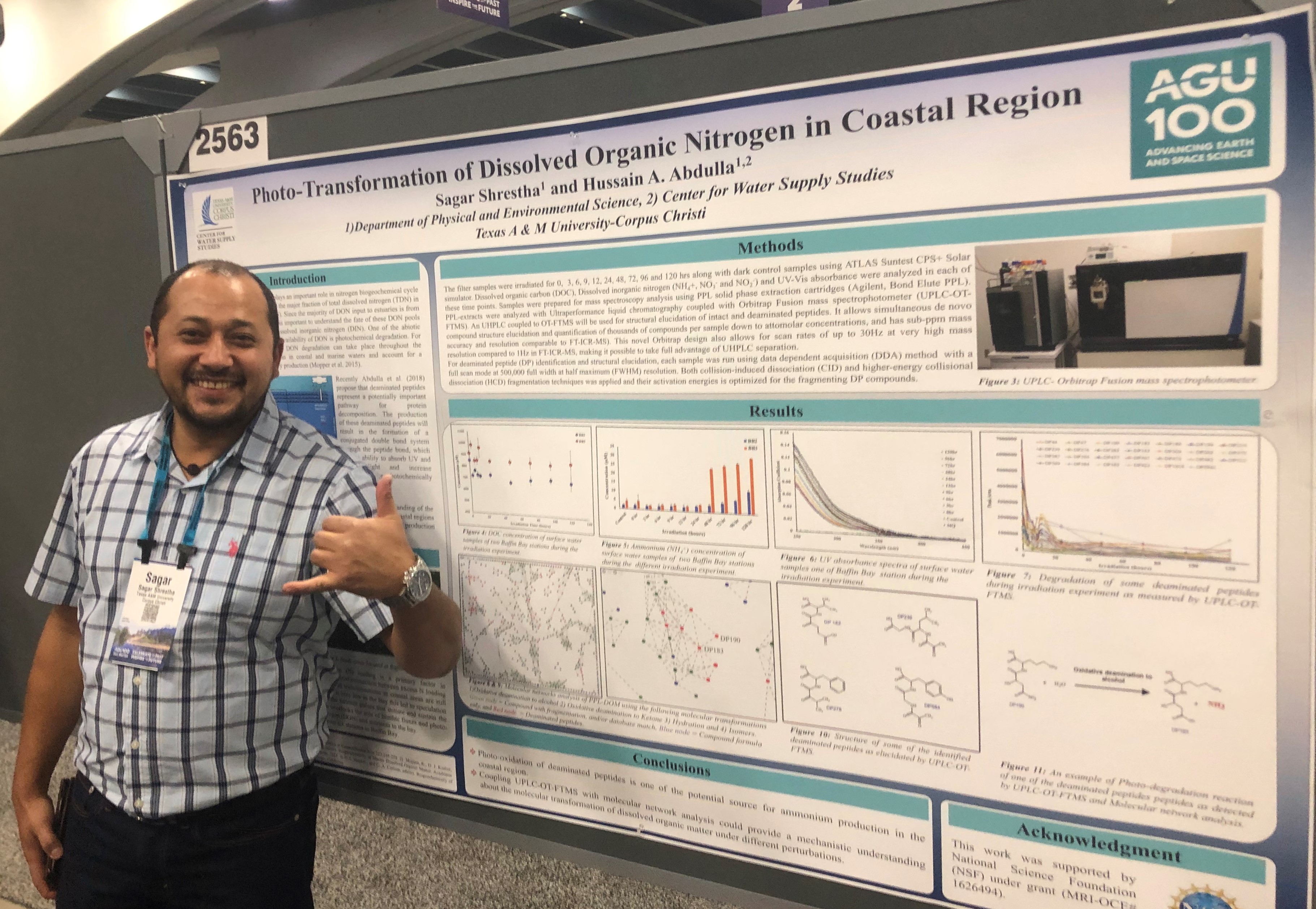 Sagar Shrestha, PhD candidate, presents his work on "Photo-Transformation of Dissolved Organic Nitrogen in Coastal Region" at the Biogeosciences poster session.
Sagar Shrestha, PhD candidate, presents his work on "Photo-Transformation of Dissolved Organic Nitrogen in Coastal Region" at the Biogeosciences poster session.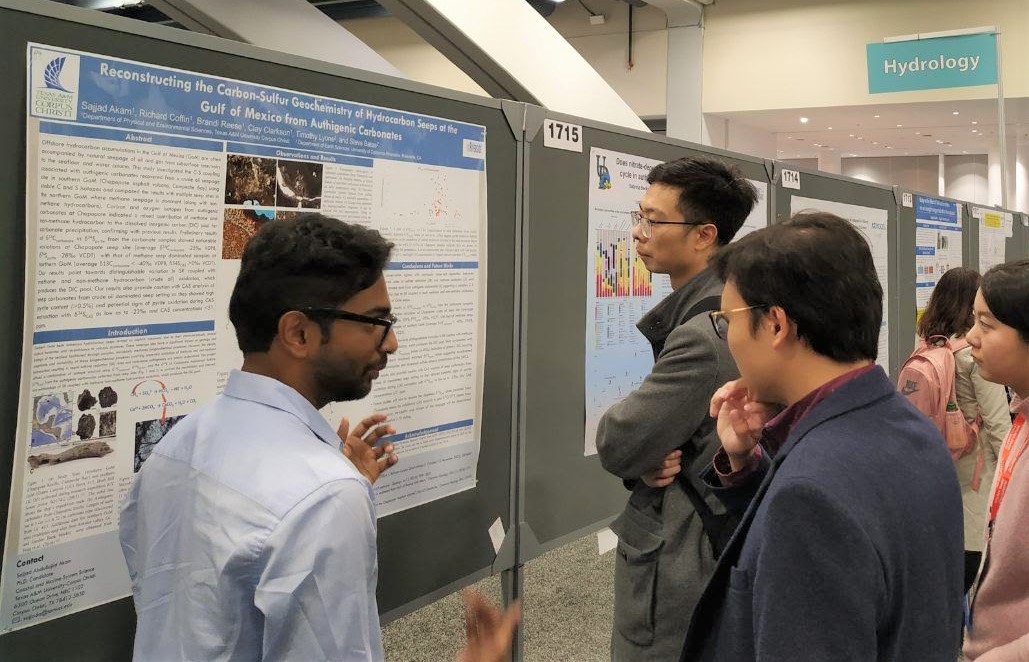 Sajjad Abdullajintakam (PhD candidate) presents his research into "Reconstructing the Carbon-Sulfur Geochemistry of Hydrocarbon Seeps in the Gulf of Mexico" at the Ocean Sciences poster session.
Sajjad Abdullajintakam (PhD candidate) presents his research into "Reconstructing the Carbon-Sulfur Geochemistry of Hydrocarbon Seeps in the Gulf of Mexico" at the Ocean Sciences poster session.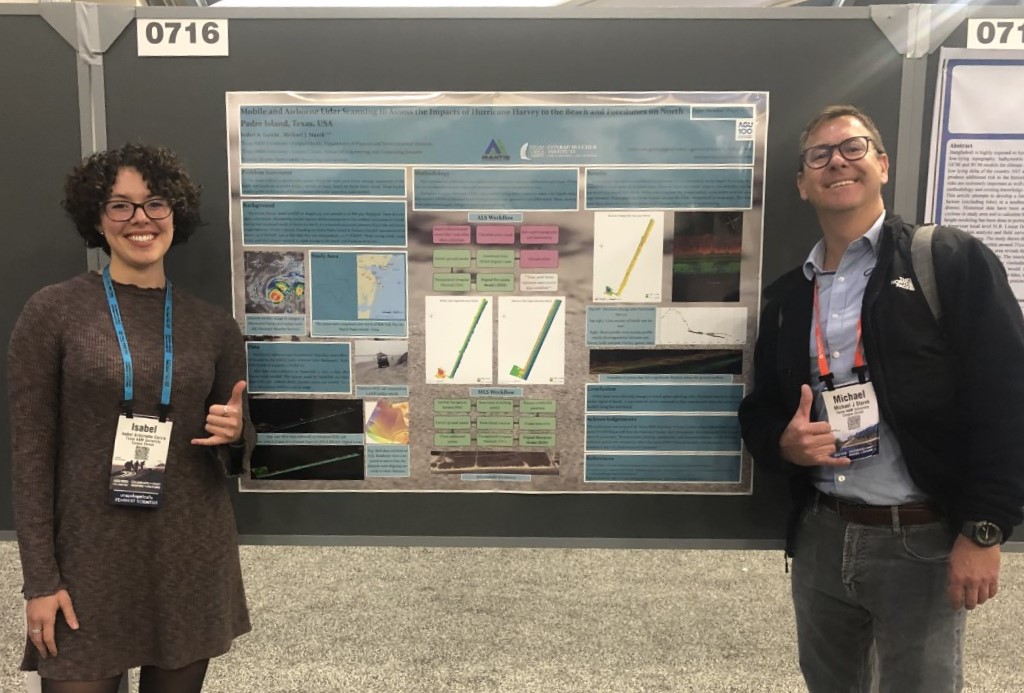 Isabel Garcia (PhD student), alongside advisor Dr. Michael Starek, presents her research on "Mobile and Airborne Lidar Scanning to Assess the Impacts of Hurricane Harvey to the Beach and Foredunes on North Padre Island, Texas, USA".
Isabel Garcia (PhD student), alongside advisor Dr. Michael Starek, presents her research on "Mobile and Airborne Lidar Scanning to Assess the Impacts of Hurricane Harvey to the Beach and Foredunes on North Padre Island, Texas, USA".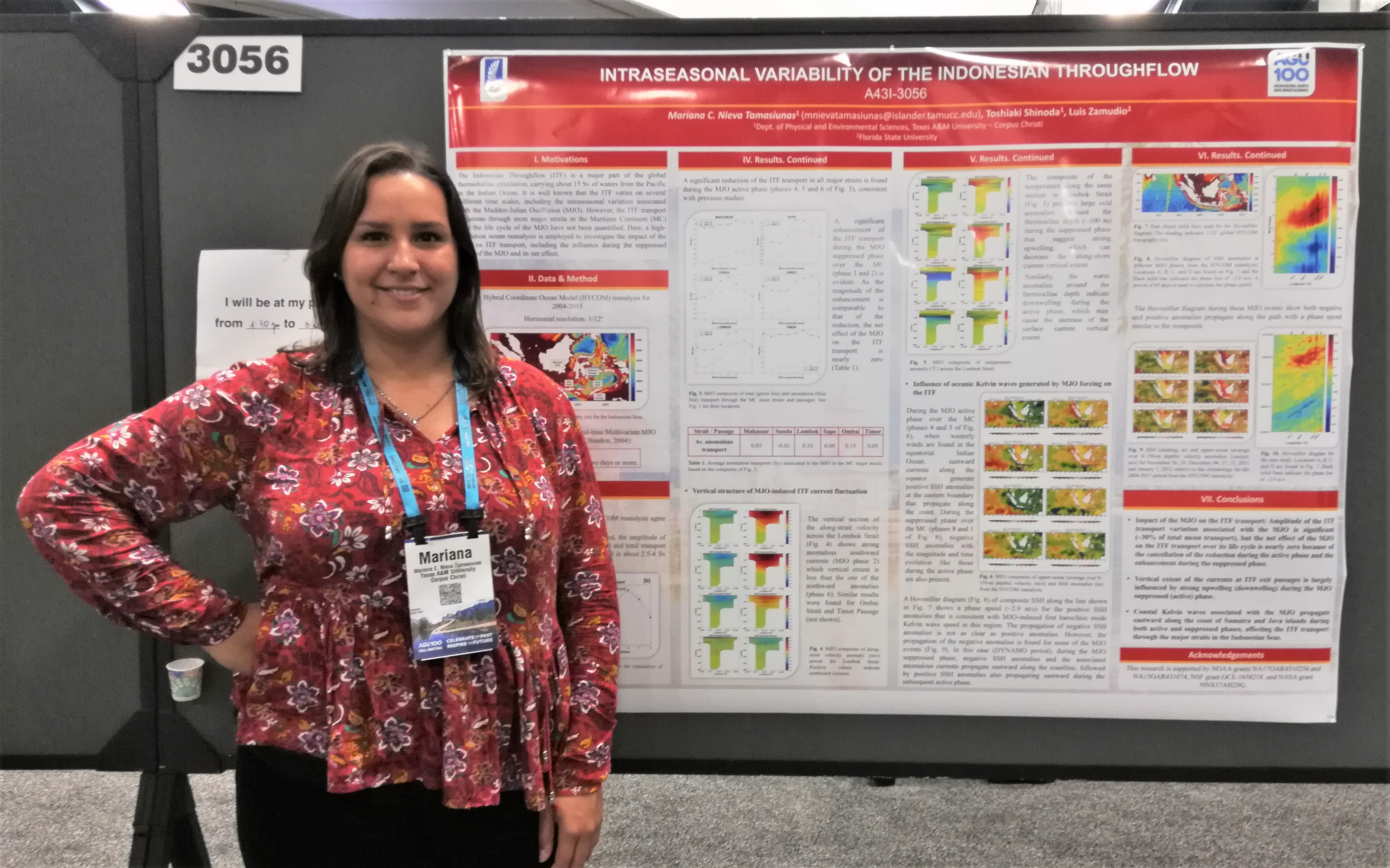 Mariana Carolina Nieva Tamasiunas (MS student), presents her research on "Intraseasonal Variability of the Indonesian Throughflow" at the Atmospheric Science poster session.
Mariana Carolina Nieva Tamasiunas (MS student), presents her research on "Intraseasonal Variability of the Indonesian Throughflow" at the Atmospheric Science poster session.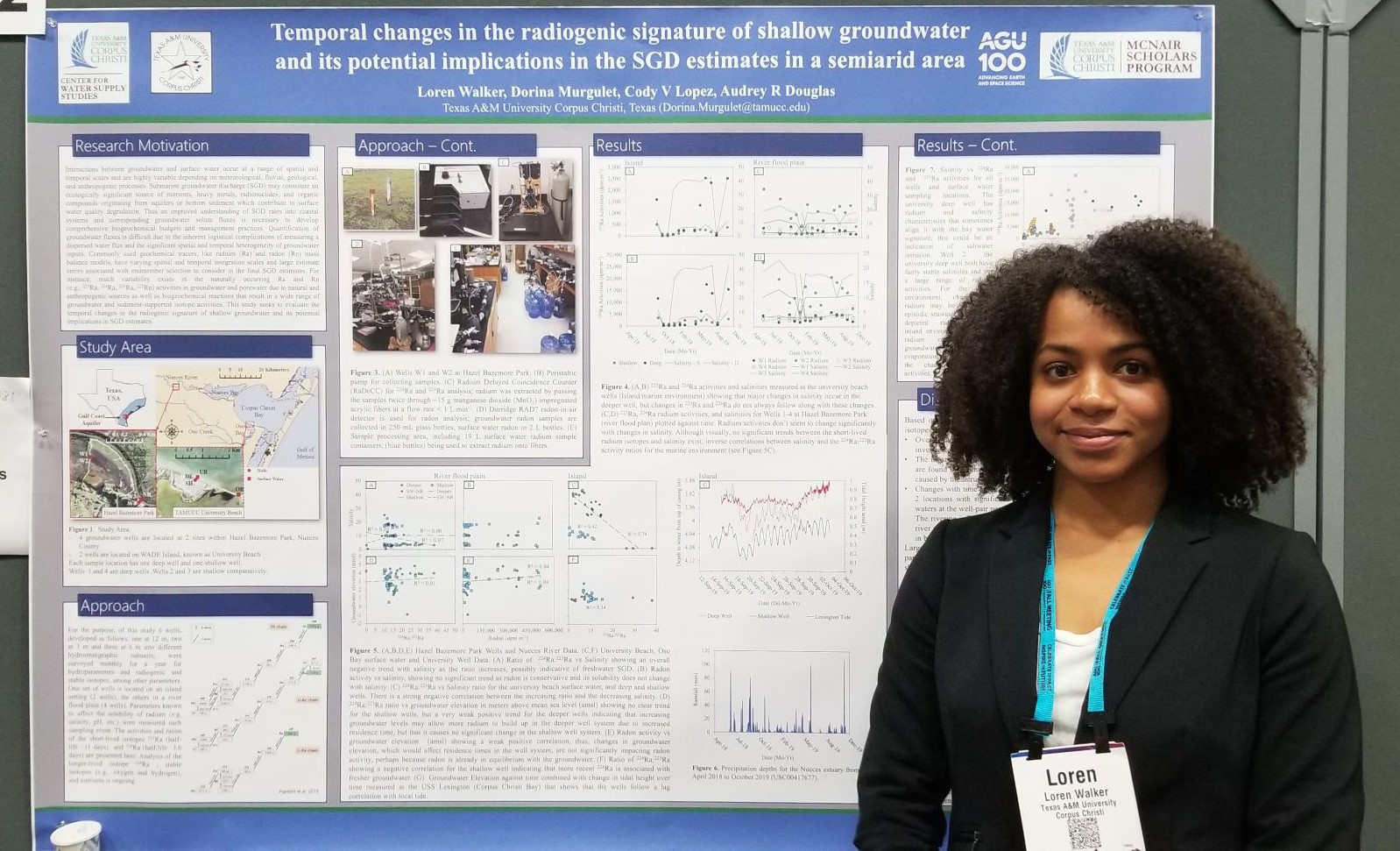 Loren Walker (undergraduate research assistant) presents her research on "Temporal changes in the radiogenic signature of shallow groundwater and its potential implications int eh SGD estimates in a semiarid area" at the Hydrology poster session.
Loren Walker (undergraduate research assistant) presents her research on "Temporal changes in the radiogenic signature of shallow groundwater and its potential implications int eh SGD estimates in a semiarid area" at the Hydrology poster session.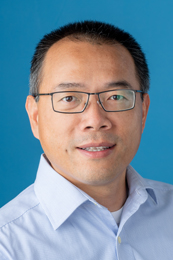
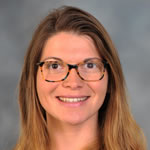
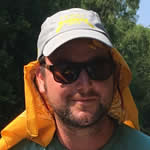
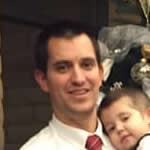

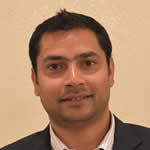
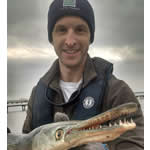

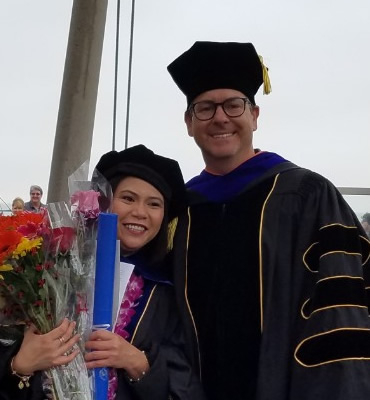
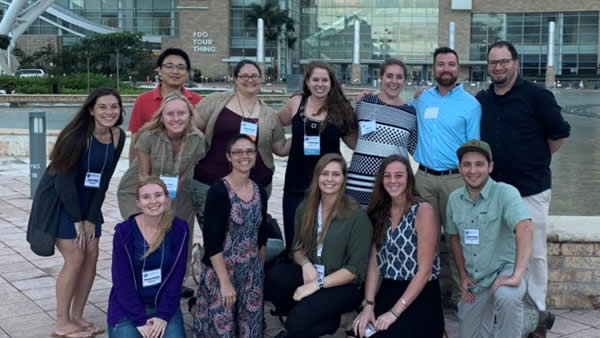
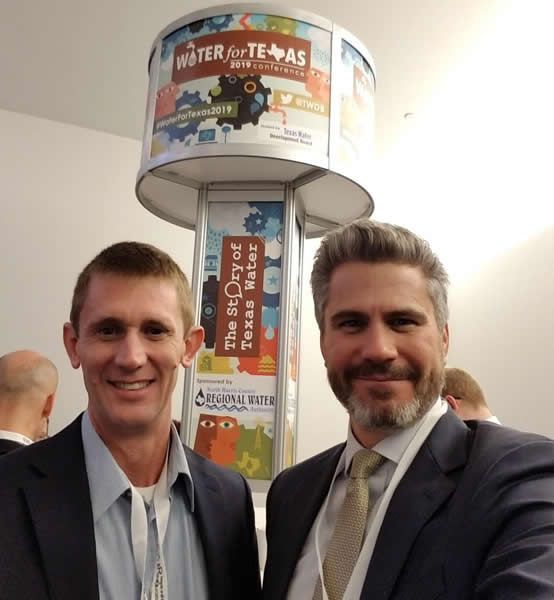
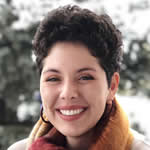
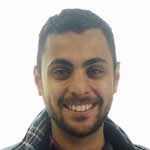
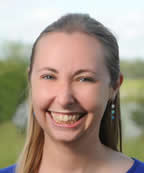
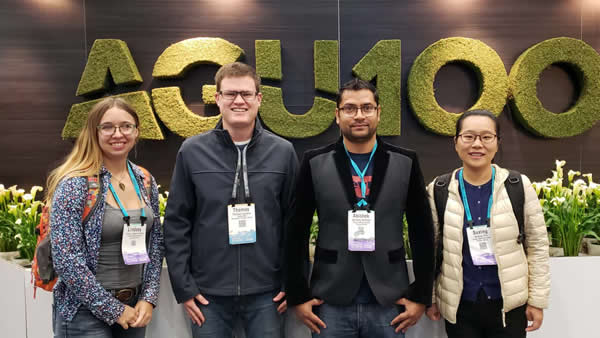 Members of Dr. Chuntao Liu's lab
Members of Dr. Chuntao Liu's lab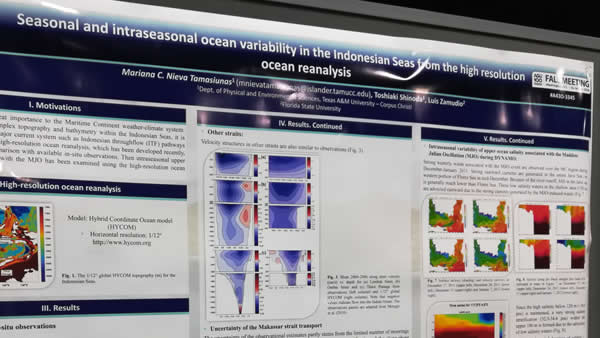 Mariana's Poster on the Indonesian Seas
Mariana's Poster on the Indonesian Seas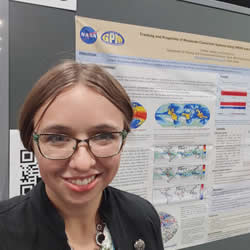 Lindsey Hayden at her poster.
Lindsey Hayden at her poster.